Matthew Carr's Blog, page 8
August 13, 2024
...And Breathe

Anyone who has ever been in a crowd will have experienced those moments in which you seem to have become part of something larger than yourself. Such moments can be joyous, liberating and life-affirming. In politics, they can provide strength, power and unity of purpose.,
But crowd-emotions can also be dark, cruel and bitter. They can be whipped up by demagogues, and channelled into leader-cults. They can be a kind of liberation from restraint, in which anonymity enables its members to do things that were previously forbidden. In these moments, the crowd can turn into a lynch-mob or a pogrom, in which individual conscience, fear of the law or censure all dissolve into rage and hatred, and its members feel that none of them are responsible for anything.
Ten days ago, these were the crowds that found their moment of collective liberation in streets up and down the UK. Over two days and nights, racist mobs, fuelled by malicious misinformation about the Southport murders, burned a library, a citizens’ advice centre, and a hotel housing asylum-seekers, set fire to police vans and private cars, dragged Asian taxi-drivers from their cars, and smashed shop windows, cars and peoples homes - especially homes where black people lived. They threw rocks at police and at Filipino health workers. In Hull, they stopped cars and instigated ‘traffic checks’ in which only white drivers were allowed to continue.
While angry tanked-up men snarled and threw punches at the police, others took the opportunity to engage in festive looting of sausage rolls, vapes and crocs. Parents brought their children along to watch a mob set fire to a Travelodge housing asylum seekers, and rioters took giddy videos of lootings and burning police vans on their mobile phones.
All these events were part of the flashmob insurrection-cum-pogrom that shook towns and cities across the UK, egged on by an ex-kickboxer, misogynist and alleged-rapist, a former failed contestant from a reality tv show, an oily provocateur dozing on a sun-bed in Cyprus with a mobile phone, and amplified by the richest man in the world - though he may not be for long.
According to Stephen Yaxley-Lennon - the 5-star Wat Tyler and enemy of the state - this was the moment when ordinary British folk had had enough. Watching the country go up in flames from his swimming pool, Yaxley-Lennon was careful to use the word ‘peaceful’ as he issued summons to the faithful to attend ‘protests’ that were already anything but. Others were more forceful - on Twitter/X, at least:

If this was war, Fox was nowhere to be seen fighting it, and quickly deleted this tweet when the ‘war’ began to turn against those who were. Throughout this process, Nigel Farage and Richard Tice and other Reform UK luminaries did what they could to legitimize the ‘protests’ and undermine the Labour government, while also carefully distancing themselves from any negative legal consequences. A screenshot from Reform UK’s FB group gives an indication of the game they were playing:
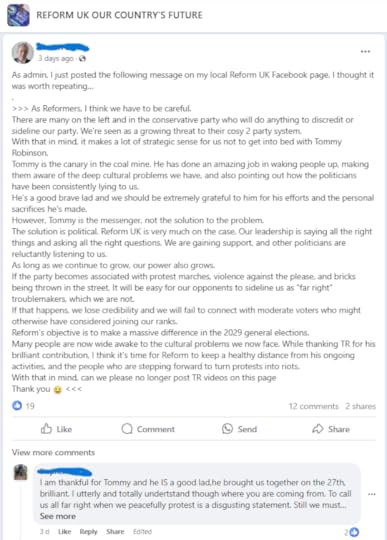
A good brave lad, but not part of the ‘solution.’ That role is reserved for the ludicrous Nigel Mosley-Farage, simultaneously an agent of chaos and also the cure for it:

It’s easy to laugh at Mosley-Farage’s Poundland Fuhrer schtick, but just because you’re ludicrous, doesn’t mean that you aren’t dangerous. Farage, Robinson, Hopkins & co are dangerous, because of the movement they belong to, the money they can draw on, the constituencies they are able to reach, and most of all, because of the volatility and fragility of a country that, in 2016, leapt into the dark without knowing where it was going to end up, and has never really stopped falling.
Now, a single weekend of violence and mayhem has undermined decades of the slow, sometimes difficult, but not unsuccessful construction of a multi-ethnic society from the ruins of empire. There are now Muslims and people of colour who have been frightened enough by the violence to stay in their homes, and it is difficult to avoid the conclusion that the ‘anti-immigration protests’, as the BBC politely calls them, them, were intended to dominate the streets and terrorize communities who the ‘protesters’ believe have no right to be in the UK, and who they refuse to accept as their equals even if they were born here.
The videos, mugshots and potted biographies of the rioters who have been arrested tell a bleak and sorry picture: of men and women of all ages who vented their spleen on people who are no more privileged than they are. Some of them already had a record of criminal violence. Others now have one, and will be in jail for a year or more, because they drank or snorted too much, or because they were too readily seduced by the lies and provocations of people who will never feel the consequences of the lies they told, because they got caught up in the atmosphere of festive destruction and collective cruelty.
Whatever their personal motivations, all of these people will have received the messages about ‘illegals’, migrant ‘invaders’ and queue-jumpers, ‘stopping the boats’, Rwanda, grooming gangs, and white ‘replacement’, emanating from a wide spectrum that extends from far-right internet provocateurs, Russian bots, and Tory and Reform UK politicians present white people and the white working class as marginalized outsiders in a country that no longer belongs to them.
For the last ten days, many of these politicians have been pumping out the brazenly dishonest accusation of ‘two-tier policing’ in order to keep the resentment and white victimhood boiling over. On 6 August, Douglas ‘Genocide Doug’ Murray, looking and acting very much like Joachim Phoenix’s psychotic emperor in Gladiator, gave an interview for Australian tv in which he pontificated on the ‘protests’ in the following terms:
Clearly they’ve lost control of the streets. Now is it time to send in the Army at some point? Probably yes, but if the army will not be sent in then the public will have to go in and the public will have to sort this out themselves and it’ll be very very brutal… We have thousands, tens of thousands, probably hundreds of thousands of people in the UK who have no love at all for the UK, but yet live here. I don’t want them to live here. I don’t want them here. They came under false pretences. Many of them came illegally and continue to come illegally and we don’t want them here, and I’m perfectly willing to say that because it needs to be said.
These pronouncements are certainly more articulate than your average Twitter/X troll, but they come from the same dank place. And if you talk quasi-mystical racist gibberish in a plummy accent about people ‘trampling on the English soul who are gleeful in their trampling’ who have ‘defaced and defiled our holy places’, there will always be people who mistake your rantings for pearls of wisdom.
As for Murray’s throwaway mathematics - thousands, tens of thousands - when it comes to ‘them’, who cares about accuracy? Never mind that the ‘public’ were ‘sorting things out’ by dragging random Asians from their cars or throwing rocks at Filipino NHS workers.
That is the task of these fine English yeomen who are now spending time at His Majesty’s pleasure. The task of Murray, Farage, Tice, and so many others, is to turn their anger into money, clicks, and political gain.
And yet despite all this, they haven’t got what they want. Zero Tolerance Nigel has been plummeting in the polls, even amongst Leave voters, as a result of his devious posturing during the riots. The government did not lose control of the streets; the Army was not sent in. This was partly due to the rapid police deployment and legal response, orchestrated by a government that, unlike any of its Tory predecessors, knows when urgent action is required.
Faced with this disappointment, the pot-stirrers have switched their lines of attack, and are now condemning the arrests of social media trolls as an attack on free speech. They have described the harsh sentences handed out to rioters and online hatemongers as draconian, ‘Two-tier Kier’ etc. The world’s richest man has trolled the UK government with tweets like this:

And Reform UK have amplified these messages, and bowed down before Psycho SpaceX’s inanities, no matter how brazenly racist and Islamophobic:

This is what they will always do. But despite their worst efforts, the government has weathered this storm. The tough sentencing will have made some would-be ‘protesters’ think twice about getting stuck in a second time, and the police presence has provided reassurance where it is needed.
But the other reason why the insurrection has fizzled out is because of the popular mobilisations that took place last Wednesday, in response to the list of immigration lawyers’ offices and other targets listed by the far-right on social media. In cities across the UK, anti-racist gatherings were so huge that only a few ‘protesters’ showed up in the places they had been summoned to.
The mood of these gatherings was very different to the destructive mobs that wrought such havoc ten days ago. The crowd I joined in Sheffield on Wednesday was serious, defiant, and united in its determination to oppose the fascists and racists, and defend Sheffield’s many ethnic communities from violence and intimidation. In Walthamstow, more than 10,000 people came out onto the streets:
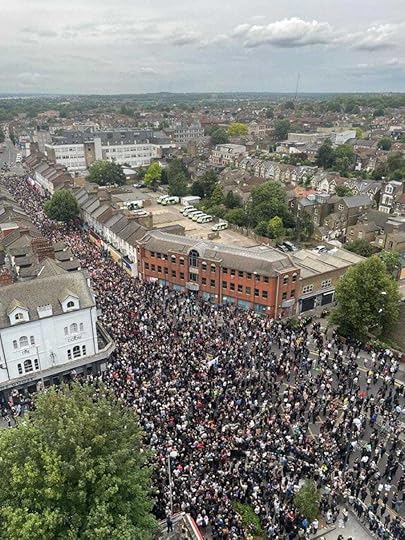
After the horrors of Southport, Hull and Tamworth, these were heartening expressions of solidarity, that even the Daily Mail and the Daily Express felt obliged to praise.
This movement is impressive, and it will hopefully continue to grow, because there are limitations to the ‘thug’ narrative emanating from the tabloids and from the government. But ‘thugs’ may participate in riots: they aren’t necessarily the cause of them. Their thuggery was directed at very specific targets: Muslims, asylum-seekers, and people of colour. They were violent expressions of what the late Ambalavaner Sivanandan once called ‘xeno-racism.’
This needs to be understood and faced up to. If Labour adopts a purely law and order position on the riots, and takes ‘controlling immigration’ and reinforcing ‘community cohesion’ as its main takeaways, it will find itself exactly where the Blair and Brown governments once found themselves - indirectly reinforcing the legitimacy of far-right positions without actually being able to neutralize them.
This month, Home Office visa figures recorded a drop of 81 percent in applications in Health and Social Care compared with last year, and a drop of 16 percent in sponsored study applications at UK universities, and an 81 percent drop in sponsored study dependent applications.
Losing care workers and foreign student should not be something to celebrate. But incredibly, politicians like James Cleverly have been boasting about this figures, as if they were an achievement. This is what the toxic anti-migrant politics has made us - a country that cuts off its nose to spite its face.
We need to ask ourselves if this is the kind of country we want the UK to be. Because if we continue along this trajectory, the UK will become exactly what so many of the rioters and their intellectual fellow-travellers what we saw ten days ago.
Lastly, and by no means least, Labour needs to help the communities where these riots began, and where they might start again. It has been laughable - and contemptible - to see the likes of Richard Tice, Alex Phillips, Ben Habib, Isabel Oakeshott or Douglas Murry pretending to care about the lack of opportunity and public services amongst marginalized white working class communities.
Debates about neglected and abandoned communities should not be left to pundits and politicians who have no concern with the working-class beyond their use as footsoldiers in a nationalist/nativist project. A Labour government should do better than this. It is not necessary to depict the racism as a cry of pain or a call for help. But there are communities in the north of England in particular that have been left to rot ever since Thatcher’s ruthless de-industrialization. If some of them had received help in the past, they might not be so disposed to listen to the toxic and divisive messages that brought them out into the streets.
For now, we can breathe. Because last week’s mobilisations represent a defeat for the racists and also for their fellow-travellers and intellectual authors. They have shown us the possibility of another country - a country that is not frightened of the racists, a tolerant country that does regard refugees as dehumanised ‘illegals’, and does not hate the men and women who have come to live and work here.
But even though the fires have been put out, the hatred still smoulders, and it’s up to all of us who believe that this country can be better, to make sure that it never erupts into our streets again.
Thanks for reading Matt Carr’s Infernal Machine! Subscribe for free to receive new posts and support my work.
August 4, 2024
White Riots

Societies can rot for a long time before they fall apart, and when the collapse comes, it can be swift, abrupt and impossible to ignore. It’s little more than a week since a Cardiff-born teenager of Rwandan parents who once dressed as Doctor Who in a Children in Need advert carried out the atrocious murders of three young children at a Taylor Swift dance party. Within hours, the horror and grief at this appalling crime had triggered a vicious eruption of street violence and near-pogroms that has no precedent in modern English history.
‘Protests’ have turned into brutal brawls with the police and acts of looting and arson, attacks on mosques and on hotels housing asylum-seekers. In Southport, 57 police officers were injured. In Sunderland a police station and a citizen’s advice centre were set on fire. In Liverpool rioter burned a library. In Hull, they looted Greggs and dragged an Asian man from his car before setting it on fire. In a protest outside Downing Street, more than 100 arrests were made. In Rotherham a mob set fire to a Holiday Inn supposedly housing asylum seekers, yelling ‘kill them.’
Let no one think for a minute that these events were caused by grief and anguish at the murders of three children, or concern for their families. We are witnessing one of those historical moments, which can happen to any country and at any time, in which the veneer of civility vanishes and a society succumbs to its worst instincts, and makes a bonfire of decency, humanity, morality and logic.
The participants in this nativist bacchanal don’t like to be called ‘far-right’, and up to a point they are correct. The boozy flashmobs and Tiktok ‘patriots’ throwing bricks at police or setting fire to cars and police stations are not Mussolini’s paramilitary arditti, or Hitler’s brownshirts - yet. Some of them seem to be barely aware of what they’re doing or why they’re doing it. But you don’t have to carry a Nazi party card, or strut around in leather boots and a black uniform to be part of the ethno-nationalism, anti-immigrant and anti-Muslim bigotry which have defined the far-right, alt-right and identitarian ‘take our country back’ movements in so many countries in recent years.
Nor are these mobs as inchoate as they sometimes seem. In fascist Italy and pre-Nazi Germany, paramilitary forces practised what was then a new form of militarised politics and politics-as-war, in order to terrorize their opponents and bring down democratic governments. In Germany, stormtroopers systematically attacked communist meetings and demonstrations not only to intimidate their left-wing enemies, but to send a wider message to society - that the government of the day was unable to provide basic security.
In cultivating an atmosphere of panic, insecurity, and disorder, the Nazis created the disease and then presented themselves as the cure. A similar dynamic can be detected in the UK right now, in the cynical haste with which a motley combination of politicians, trolls, far-right activists and radicalised ‘protesters’ have turned the murders of three schoolchildren into an opportunity to take ‘their’ country back from the Muslims, immigrants and the liberal, multiculturalist ‘elites’ who have supposedly stolen it.
At present, their tactics are only embryonic. Like the anti-lockdown and anti-15 minute city demonstrations, this week’s disaggregated ‘protests’ relied heavily on ‘leaderless’ mobilisations, and snippets of fake news transmitted through social media, originating from various sources, some of which may be Russian. On the evening of the murders, a formerly Russian-owned news site called Channel3 Now circulated a fake story that the suspect in the Southport murders was an asylum seeker named Ali Al Shakati, who was supposedly on a terrorist watchlist.
By the time Merseyside police revealed that none of this was true, it made no difference. Aided by the dregs of social media - Atherton, Fox, Hopkins, Spofforth and so many others - the lie had done it’s work. Wrapped in their Saint George flags and Union Jacks, few of the brick-throwing ‘patriots’ raging against Muslims or Islam cared that ‘Ali Al Shakati’ was Arabic for ‘I have to go to my apartment’.
Thanks for reading Matt Carr’s Infernal Machine! Subscribe for free to receive new posts and support my work.
This is not to say that Russia was responsible for this descent into the vortex. Disinformation only works when it has a credulous audience. And in our conspiracy-obsessed reactionary times, there is no shortage of people willing to believe anything, particularly when it comes to Muslims. Even if there is no central direction behind the ‘protests’ coordination is not absent. The EDL may no longer exist, but the expatriate sun-lounger Stephen Yaxley-Lennon aka Tommy Robinson - has been celebrating these ‘protests’ all over Twitter, inevitably with an anti-Muslim slant.
Yaxley-Lennon has also posted dates and places for further protests, while crowing that ‘Britain is rising.’ He is one of the organizers of a ‘pro-UK rally’ to be held in Glasgow on 7 September, in order to ‘share our distrust and fear of the future’ - quite possibly one of the most bizarre reasons for a demonstration in British political history. As Searchlight magazine has pointed out, Yaxley-Lennon’s minion in the UK, cokehead-turned-Christian Danny ‘Tommo’ Thomas, filmed himself in his car, in order to deliver the following messages:
“Every city has to go up.”
“Get prepared. Be ready. We have to.”
“It has to go off in different cities.”
“We have to show them we’ve had enough.”
“I’m ready to go. I know that a lot of you are. I’m speaking to other people at the moment”.
“We’re ready to go. We are, literally, ready to go.”
“Just get ready.”
This isn’t an explicit call for violence, but it doesn’t have to be. Yaxley-Lennon and his pals have learned how to stay just within the limits of legality, while creating the conditions in which violence is likely to occur. And if it kicks off, then there’s nothing to pin on them. It’s a dirty game, and they aren’t the only ones playing it, because the ‘protests’ are not simply an explosion of social media madness.
The people’s tribune, Nigel Mosley-Farage seized immediately on the opportunity the murders provided, with a despicable video flanked by two Union flags in which he pretended to ‘ask questions’ about spurious conspiracy theories, before delivering a part-warning, part-invitation, to his Alan Partridge fascist apocalypse:

Mosley-Farage would never advocate violence, of course, but violence suits him, because chaos and division suit him, just as much as they suit the hundreds of anonymous accounts all over Twitter, with their football club profiles and their sinister messages accusing the police of ‘two-tier policing’. And not all of them are anonymous:
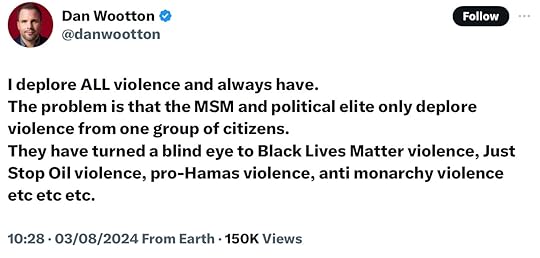
This, like so much that comes out of Wootton’s uniquely-depraved mouth, is a lie. In more than ten months, not one of the Gaza demonstrations has degenerated into the kind of violence that took place last week, and if it had, you bet we would have known about it. But the suggestion that last week’s ‘protesters’ are somehow victims of police discrimination is another chapter in a longer narrative of ‘indigenous’, (white) working class victimhood that is as central to 21st century ethno-nationalist politics as it once was for the Nazis .
The Nazis once depicted the German people as victims of Bolshevik and Jewish conspiracies that took advantage of their good faith. They also framed ‘popular’ acts of anti-Jewish violence as expressions of righteous anger. Some of our present-day ‘commentators’ have responded to the events of the last week in exactly the same way:
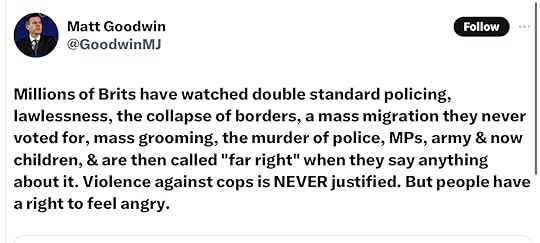
Note the capitals. Goodwin is NOT one to get his own hands dirty and throw a brick at ‘cops.’ There are a lot of things that people never voted for, but organic intellectuals like Goodwin are only ever interested in one of them, and this ‘ what can you expect?’ faux-empathy is also part of the game. As Richard ‘Tricky Dicky’ Tice, put it, while sharing Goodwin’s pearls of wisdom last week:

To paraphrase Mick Jagger, what can a poor boy do when the ‘elite’ seek to ‘silence’ him, except drag a dark-skinned man from his car, loot Greggs, or burn down the local citizen’s advice centre? And no one familiar with the fiery fireman-turned-culture warrior Paul Embery’s output, will be surprised to find that all this is the fault of the liberals:

The ‘dominant liberal class’ - that would be (checks notes) the Tories who have run the country for 14 calamitous years? And as for those ‘legitimate concerns’, please.
I came back to this country from the West Indies as a child in 1967, at the age of eleven. Since then, there has barely been a single year when English ‘concerns’ - were not being directed at some group of undesirable foreigners. Caribbean immigrants; Enoch Powell; Indians and Pakistanis; Ugandan and Kenyan Asians; Margaret Thatcher’s ‘swamped by another culture’ vote-scraping; Kosovans and Roma people; the asylum-seeker ‘scum of the earth’ who were supposedly ‘targeting our beloved coastline’ at Dover in 1999; Muslims; Romanians and Bulgarians; EU nationals - if the ‘elite’ was silencing ‘concerns about immigration’, it wasn’t very good at it.
No British government has ever seriously challenged this rhetoric. Too many have pandered to it. In the years leading up to Brexit, there were very few weeks when a right-wing tabloid didn’t have a front-page story about Poles swamping English villages, Romanian gangs, asylum-seekers staying in 5-star hotels. For the last three years, a succession of wretched Tory governments have allowed the asylum application process to collapse, and transformed ‘stop the boats’ - the same call heard on many ‘protests’ this week - into another ‘Brexit freedom’ and a rallying cry against a migrant ‘invasion.’
Now, the same people who have done so much to fuel the violence that erupted last week are seeking to present its perpetrators as victims:

Not everyone expresses their ‘passion’ by attacking a mosque which had nothing to do with the issue they are ‘passionate’ about. But don’t expect the likes of Michelle Dewberry to give a damn - that’s not what she’s paid for.
It seems like decades ago - though it is little more than a week - since these same commentators were ‘supporting’ the Manchester police officer who kicked a (brown) man he had already arrested while he was lying on the ground, and then stamped on his head. The same people were also celebrating the five-year sentences handed out to Just Stop Oil protesters who planned a sit down blockade in a motorway. They were passionate too, but not about the right things.
The devious hypocrisy and stupidity of such responses shouldn’t diminish the seriousness of what is taking place - or the strategy that is now being pursued by Conservative and Reform MPS, of condemning the violence while also subtly legitimising it - the better to pin it on the Labour government. Within hours of the Southport murders, accounts on Twitter were calling for Keir Starmer and Yvette Cooper to resign, even though they have barely been in office.
Why they had to resign was not clear, but this is a movement that thrives on deceit and manipulation, not clarity, and even those who are pretending to keep their distance from the ‘unrest’ recognize the opportunities it provides. This is why Priti Patel demanded the recall of Parliament, and accused the Government of ‘appearing to be swept away with events rather than maintaining control of them.’
When Starmer made a strong speech promising to protect British Muslims, in which he (correctly) denounced the ‘protests’ as a manifestation of ‘far-right hatred’, he was immediately accused of disrespecting the ‘legitimate concerns’ of the people who took part in them. In a statement that has since been taken down, Donna Jones, the Tory police and crime commissioner for Hampshire declared:
The announcement of the prime minister’s new violent crime units have led to an accusation of two tier policing, which has enflamed protesters who state that they are battling to protect Britain’s sovereignty, identity and stop illegal migration.
Jones went on to argue:
Whilst the devastating attacks in Southport on Tuesday were a catalyst, the commonality amongst the protest groups appears to be focussed on three key areas: the desire to protect Britain’s sovereignty; the need to uphold British values, and, in order to do this, stop illegal immigration.
With friends like that, the Government doesn’t need enemies, and Jones is not the only Tory seeking to present Labour as the party that failed to ‘stop the boats’ and has lost control of law and order. Reform Public Company Ltd have also sought to use the violence - which they absolutely condemn but also understand - to their own advantage:

The UK is ill-prepared for an onslaught of this magnitude. Its political class has either been complicit in Britain’s toxic anti-immigrant politics or too cowardly to challenge them. Its flagship broadcasting company has repeatedly given Farage and his cohorts a platform, and much of its mainstream media is simply too shallow, too timid, or too right-wing to face up to the calamity that is now unfolding.
Nor is the Labour government the ideal bastion of anti-fascist/anti-racist resistance. Labour is in power in part, because the party’s right-wing, including some of its own MPs, weaponised antisemitism in order to destroy the left. Now Labour faces not ‘tropes’, but raging bare-knuckle racism that is out in the streets, and threatening communities across the country, and beyond. It’s not for nothing that MAGA accounts in the US shared disinformation about the Southport murders, or that the European ‘Identitarian’ group Action Radar Europe, which calls for a ‘European Reconquista’ and ‘re-migration’ (mass deportations) has been publishing posters like this one:

The ethno-nationalist rebellion that brought us Brexit was always part of an international movement, and was celebrated by that movement, just as the far-right insurrection that is now unfolding is being celebrated as the ‘resistance’ and precursor to the ‘civil war’ that the far-right aches for, and that men like Breivik once killed for.
There are a lot of people in Elon Musk’s dystopian ‘X’ playground rubbing their hands with glee at this possibility. Musk himself commented on a picture of the UK riots yesterday that ‘Civil war is inevitable.’
Only for fascists and billionaire psychopaths. They dream of deportations, racial conflagrations and the final showdown that will give them ‘their’ country back. It is incredible and almost surreal to watch a democratic government allowing a tech company to provide a platform that has enabled these people to propagate these messages and terrorize communities.
Faced with this threat, Starmer has spoken well. He has tried to reassure the objects of these attacks and called out their perpetrators for the far-right thugs that they are. Now he must do what he has promised to do in his two speeches, and bring the full force of the law to bear on the perpetrators and their enablers.
But this isn’t something that politicians - even well-intentioned ones - can sort by themselves. We need national networks of solidarity that can protect communities under attack, and defend the multicultural and multi-ethnic society that has taken many decades to build. We need the broadest-possible coalitions and alliances in every city and neighbourhood so that we can marginalise the ‘patriots ‘ and prevent them from dominating our streets.
We saw what was possible in Southport, Manchester, Nottingham and Liverpool. That must be the way forward, no matter who we are or where we are. Because if we can’t do it, and we let these ‘patriots ‘ win, then the well that we all drink from will be poisoned still further, and this foolish, troubled country will continue to sink deeper into the vortex of violence, division and hatred that is now opening up so terrifyingly beneath our feet.
July 30, 2024
Ay Kamala!

Life, as Ferris Bueller once observed, moves pretty fast, but politics can move even faster. It’s only two weeks since I posted a newsletter suggesting that Joe Biden should resign so that the Democrats would have even a fighting chance of beating Trump. At that point, Trump had just been shot at, and it was beginning to look as though his brush with martyrdom might have gifted him the presidency.
In the week that followed, the MAGA Republican National Convention confirmed the Trump ascendancy with the cult-like fervor that the world has come to expect from such occasions. Delegates accessorised with bandages stuck to their ears to hail the miraculous salvation of the chosen one who ‘took a bullet for democracy’ and still found time for a photo-op. Trump kissed the mounted helmet of the fireman who was killed during the attempt on his life. Only the Pentecostal serpent handlers were missing, but maybe I just didn’t see them
From a British point of view, it was darkly comical to see three of our most notorious political parasites hovering round the rancid corpse of the Republican Party like flies at a dungheap. There was Farage, already bored with Clacton and looking for photo ops with his great friend Donald to boost his international profile, only to discover that his great friend was too busy to see him. Liz Truss also rocked up, exuding her usual glazed conscience-free narcissism in a desperate search for relevance or simply someone who might recognize her.
Eventually that person turned out to be Farage. Not necessarily a dream date for either of them, but beggars can’t be choosers.
Russell Brand, the former leftist revolutionary messiah, alleged rapist and born- again Christian, could also be found slouching towards Milwaukee, ‘reporting’ on the convention for his new scam Rumble. Looking like a cross between the pick up artist character in Magnolia and a swami-cum-sex guru, Brand treated his readers to breathless dollops of his trademark self-regarding, pretentious prose:
To know Christ is the preeminent aim in the life of every believer and to go with Our Lord and Saviour into this event was a giddying thrill indeed. The convention is of course about power. POWER. Proximity to power, need for power, love of power, disgust at power, longing for power, rejection of power.
Goodness. That sounds like something to steer clear of, even if you do have Jesus walking beside you. Despite his attempt to maintain an aloof ironic distance from these proceedings, Brother Russell was clearly entranced:
Hope might be the Spirit within us that reaches beyond time and space to some immutable principle, ever-present yet often lost, a spirit you may find when your life goes up in a phosphorous flash in a war-zone or when your choice for president is shot, or near shot, or resigns, or near resigns, when the country you love is lost, or near lost.
Whatever that meant, it was not a pleasant prospect to think that the author of this gibberish might one day be ‘reporting’ from a White House with Donald Trump in it, drowning in a sea of libertarian tech bros cash.
And then, Joe Biden resigned and everything changed. As US presidential resignations go, this one came in late, and might have been disastrous.
In 1968, against the background of the Vietnam War, Lyndon Johnson resigned earlier in an electoral year in March, taking his party completely by surprise. This was followed by a chain of calamities: five days after his resignation speech, Martin Luther King was shot dead in Memphis. In June, Bobby Kennedy was assassinated by Sirhan Sirhan. In August, the bitter contest over who should be Johnson’s successor resulted in the most tumultuous political convention in US history in Chicago.
And in November, the Democratic nominee Hubert Humphrey lost the election to Richard Nixon.
Biden’s resignation took place in very different circumstances. For the first time in American history, a sitting president resigned because he was losing his cognitive faculties. For months, Biden had been trailing Trump in the polls in the key states that he has to win. His disastrous debate performance, followed by an equally unconvincing attempt to rehabilitate himself with an interview with George Stephanopoulos, did nothing to help him or his party.
Johnson’s resignation came as a shock to his party. Biden’s was a relief. US collusion in the ongoing massacre in Gaza is as much a stain on Biden’s record as the Vietnam War was on Johnson’s. Nevertheless, in terms of domestic politics, Biden’s resignation was a courageous and selfless act. It cannot have been easy to admit to himself, his party, or his country that he was no longer capable of doing his job. Biden might feel that he deserved better, but whatever his domestic record, it was difficult to imagine him winning a brutal electoral campaign against an opponent who exudes malevolent energy.
And so Biden did the right thing, and his halting delivery and obvious frailty reminded his country why he had to do it. But then he was clever enough to immediately nominate Kamala Harris as a successor, and the Democratic Party has been clever enough to rally round her, thereby eliminating any possibility of a fractious 1968-style convention in August.
And even though Biden should have resigned earlier, the speed with which his party has rallied round Harris has already begun to make up for lost time. Within hours, grassroots and big donor contributions to the Harris campaign had gone through the roof.
Apart from money, Biden’s resignation has also brought voters. By last Friday, more than 100,000 new voters had registered to vote, the majority of whom were under thirty-five. Many of Harris’s voters are women. On the evening the resignation, 90,000 black women logged on to an online meeting to support and raise money for Harris.
Thanks for reading Matt Carr’s Infernal Machine! Subscribe for free to receive new posts and support my work.
Last Monday, 160,000 white women joined a ‘Karens for Kamala’ Zoom meeting, which has inspired more than 30, 000 men to sign up to a virtual ‘White Dudes for Harris’ meeting with Pete Buttigieg last night. Not bad for the woman Brother Russell called a ‘socially inept and empty instrument of intransigent, institutional power, solely offering cutaneous and genetic novelty to a famished pack of secularist devotees.’
Keep those cutaneous novelties coming, I say. Because the Democrats now exude determination, optimism and belief that have been conspicuously absent these last few months.
This transformation is also due to Biden’s nominated successor. Despite her vulnerabilities in previous campaigns, Kamala Harris has so far shown herself to be relatable, inspirational, tough, energetic and focused, and fully aware of the historic importance of the campaign that she now finds herself heading.
In less than a fortnight, she has become a rallying force for the broad electoral coalition that might just defeat Trump. That outcome is by no means guaranteed, and no one should think it is. Harris still trails Trump in many national polls, though some have put her ahead. But until Biden resigned, the Democrats were drifting towards a painful defeat.
Trump and his team had built their campaign on ‘Sleepy Joe’. Now they have had to pivot against a candidate who has the potential to reach constituencies that they cannot even dream of - a woman of colour, the daughter of a Jamaican father and Indian mother, who, unlike Hilary Clinton in 2016, does not act as if the presidency is ‘her turn’, but knows that she has to win it.
Now the felon has to run against the prosecutor, and even though Harris has not always done well in previous campaign debates - she was unravelled by Tulsi Gabbard in the 2019 nomination process - she and her team will know how to prepare for any encounters with a man who can barely put a coherent thought together.
Already, Trump and his supporters have responded to Harris in exactly the way you would expect them to, with misogyny, racism, lies and stupidity. Overnight, Harris has become a ‘radical leftist’ and a ‘Marxist scholar.’ Do these imbecilic lowlifes know what a ‘Marxist’ is? Clue: it’s definitely not Harris.
Birtherism has also reared its head again. A chorus of Republicans have called Harris a ‘DEI hire’ - because a woman of colour who becomes a district attorney and vice president could never have any abilities of her own.
Megyn Kelly has called Harris a woman who ‘slept her way to the top.’ According to the far-right ‘commentator’ Laura Loomer, Harris used to be an escort, and can’t have children because she has ‘had so many abortions that she damaged her uterus.’ Loomer is one of those rare ‘commentators’ who is vicious enough to make Katie Hopkins sound like Joni Mitchell. Not many people would post a tweet like this, about the wife of Senator Mark Kelly - one of Harris’s potential vice presidential nominees - who was shot thirteen years ago:

There’s only one person without shame here, and it isn’t Harris or Kelly. If these MAGA trolls sound vile, it’s because they are vile, and their vileness is likely to become even more strident and unhinged in the coming months.
But right now the vileness, stupidity, dishonesty and sheer insanity of the MAGA movement is beginning to receive a far more significant pushback than Biden managed, even when he scraped to victory in 2020. Because if Harris continues to cut through with women voters, then Trump the rapist may come to regret overturning Roe v. Wade and tangoing with the grotesque moral vacuum that is JD Vance. One minute Vance is sneering at ‘childless cat ladies’ and suggesting that Harris is some kind of welfare queen ‘collecting a government paycheck’, the next he can be found back in 2022, saying things like this:
Every day George Soros sends a 747 to Columbus to load up disproportionately Black women to get them to go have abortions in California. And, of course, the left will celebrate this as a victory for diversity – uh, that’s kind of creepy.
Personally, I suspect that voters who are not antisemites and racists will find statements like this ‘creepy’, and will avoid the rent-a-hillbilly like the plague. Many of the objects of Vance’s contempt may also be galvanized to show up at the ballot box and vote against the good old boy who once compared Trump to Hitler until he found that it was no longer in his interests.
Harris already has Beyoncé, and before long she may well have Taylor Swift. She has political momentum and grassroots support from voters who could not rouse themselves to go out and campaign for Biden. Depending - in part - on her choice of VP, she has the ability to win key states in Arizona, Georgia, Michigan and North Carolina.
As things stand, Harris is now at the centre of a movement sizzling with a positive political energy that Trump and his legions cannot even begin to emulate. To put it baldly, everything nice, decent, human, and cool about America is flocking towards her, while everything that is rotten, cruel, and corrupt is coalescing around Trump.
I am not naive enough to believe that fascistic nationalist movements can be defeated with smiles, hugs and laughter. But elections can be won by left and left-of-centre coalitions that engage and inspire voters with a positive and optimistic vision of the future, particularly when such coalitions are up against a movement like Trump’s, which cannot do any of these things.
The next four months will reveal whether Harris and the Democrats are able to sustain this. But if they keep it up, then America may well see its first female president - and a woman of colour at that.
Last year, many pundits believed that the right and far-right would be the main beneficiaries of the 2024 ‘year of elections’. But then last October, Donald Tusk’s Civic Coalition saw off the Law and Justice Party in Poland. A left-green-centrist coalition has stopped the National Rally in France. Modi has lost his majority and Labour have crushed the Tories.
It remains to be seen whether the Democrats can continue this trend. But if they do, then Laughing Kamala will be the one who laughs loudest, and whatever happens next, there will be millions who will laugh with her.
July 23, 2024
The (Ex) President of Hate

I’m out of the UK right now, and I’m re-posting an article that I wrote for Ceasefire Magazine about the August 2019 mass shootings in El Paso and Dayton, Ohio, as a follow-on from last week’s newsletter. Too many people have short memories - some deliberately so - with regards to the cruelty of Trump and his movement, and also to the fundamental role of violence in American politics and history.
When some random gunman carries out a shooting, it’s become something of a truism to say ‘this isn’t what America is’. But it’s exactly what America is. ‘King Philip’s War’ against the indigenous peoples of New England in the seventeenth century; the Sand Creek massacre of the Cheyenne and Arapaho; the shooting of the Homestead strikers in 1892; the Battle of Blair Mountain in 1921; lynchings of black people; the assassinations of presidents Garfield, McKinley, Lincoln, and Kennedy, high school mass shootings - the list is endless, because violence is as American as apple pie, the Superbowl, Mickey Mouse, and Judy Garland.
This is a country awash with guns, where anyone who wants to kill someone, for whatever reason, can usually find the means to do it. But as I argued in 2019, the Trump government represented a qualitative descent. This was the first time in US history, in which a generation of white supremacists and white nationalists took active inspiration from the man who occupied the White House, who was verbally and legislatively targeting the same people they were.
So when Trump and his minions call on the left to tone down the ‘rhetoric’ and pretend to be unifiers, we should remember their embrace of guns, and the rhetoric that this movement has so often aimed at people who could not defend themselves, and which has sometimes had the most horrific consequences.
Monday’s mass shootings in El Paso and Dayton, Ohio, have added another dismal chapter to America’s seemingly unstoppable litany of mass gun homicides. Once again, these horrifying tragedies have raised familiar questions about America’s gun culture and the ease with which firearms can be acquired, and they have also drawn attention to the ongoing threat of right-wing terrorism. Whereas the motivations behind the shootings in Ohio remain obscure, the massacre in Texas was motivated by the same white supremacist ideology that inspired the Christchurch mosque killings and other acts of right-wing violence in recent years.
According to the New America Foundation, right-wing terrorists have now killed more people on US soil since 9/11 than jihadist groups. Such violence is not a historical novelty. During the early 1990s, American right-wing and neo-Nazi groups carried out hundreds of bombings, shootings and acts of violence, culminating in Timothy McVeigh’s bombing of the Alfred P. Murrah Federal building in Oklahoma City in 1995. In those years, such groups focused their rage against a left-of-centre Democrat president who they regarded as a facilitator of the ‘new world order’ and a ‘Zionist Occupation Government’. Today, for the first time in American history, a new generation of white supremacists and white nationalists is taking active inspiration from the man who now occupies the White House.
Throughout his 2015 campaign and during his ongoing catastrophic presidency, Donald Trump has echoed and amplified white nationalist tropes and messages in order to radicalise his political base, in a way that no previous president has ever attempted to do. This is a president who has depicted Hispanic immigrants as ‘rapists’, ‘criminals’ and ‘animals’; who described the white supremacists at Charlottesville as ‘very fine people’ after a rally in which an anti-fascist protester was murdered; who smirked and cracked a joke when one of his supporters suggested at a rally that immigrants should be shot.
In the last month alone, Trump has racially targeted four congresswomen of colour and incited his followers to chant ‘send them back.’ He has compared the inhabitants of Baltimore to vermin. He has retweeted the racist enabler Kate Hopkins — a depraved hatemongering hustler with whom no previous president would have been stupid enough to be associated. Last month Trump invited fringe right-wing conspiracy theorists and an antisemitic cartoonist to a ‘social media conference’ at the White House.
On the one hand, Trump has radicalised his political base, and turned the GOP into a party that does not criticise even his basest statements or the gross acts of cruelty on the border that he has enabled — to the point when a US Justice Department official can now calmly explain to a Court of Appeals hearing that detained migrant toddlers do not require beds, soap, or toothbrushes. Republican politicians have also refrained from commenting on the call-and-response relationship that Trump has established with the white nationalist movement.
Not all members of this movement are fond of Trump, mostly because they don’t regard him as radical enough, but Trump’s rhetoric has clearly made an impact in sectors that other presidents were unable or unwilling to reach. The Twitter feed of Patrick Crusius, the El Paso shooter, was awash with pro-Trump postings. In the hate-filled screed that accompanied the El Paso slaughter, Crusius justified his actions as “an act of resistance” to a Hispanic migrant ‘invasion’ in terms very similar to those used by Trump himself, and he praised Trump even as he insisted that his own motivation preceded his presidency. The Christchurch mosque killer Brentan Tarrant also hailed Trump as a ‘symbol of renewed white identity’.
For most of the last few years, with some notable exceptions, the mainstream media and the American political establishment has ignored these connections or tried to downplay them, and the reluctance to acknowledge the dynamic that is unfolding in front of their eyes has enabled Trump, again and again, to incite hatred and then evade responsibility when such hatred turns lethal. All these tricks were on display during the last 72 hours as the Trump mafia scrambled to disentangle itself from the latest acts of bloodshed. Trump, Mike Pence, and Trump’s awful daughter, Ivanka, all issued the usual sanctimoniously inane messages calling on God to bless the victims or bless America in general.
On Monday, with astonishing gall, Trump’s ghoulish consigliera, KellyAnne Conway — the same woman who, only a fortnight ago, was asking a reporter ‘what’s your ethnicity?’ — to ‘show unity’ and ‘eradicate hatred.’ Trump himself has been busy deleting tweets in which he described Hispanic migrants as ‘invaders.’ In an address to the nation yesterday he condemned the ‘hatred’, ‘racism’ and ‘white supremacism’ that he has done so much to empower and inflame, instead blaming the killings in Texas and Ohio on ‘fake news’, video games and the mentally-ill.
Now the strategy is shifting, with Trump and his supporters attempting to link the Dayton shootings to the left and antifa. No one should be fooled by such manoeuvres, though some people will certainly allow themselves to be. Trump and his supporters do not operate according to any accepted standards of truth, morality or accountability, and they will always lie and twist the truth in order to deceive and distract attention from facts they don’t wish to recognise. None of them will acknowledge the evidence that Trump is a white supremacist and a white nationalist, whose toxic messages may have encouraged murderers and terrorists. Trump may not want people to be shot in shopping malls, but he has deliberately and cynically fuelled an atmosphere in which such incidents are likely to happen, to the point when would-be race warriors who kill migrants, Jews, people of colour, liberals and leftists or anyone else they think is seeking to ‘replace’ them or erode their ‘identity’ now believe that their time has come.
So far, most right-wing terrorists have been ‘lone wolves’ who have sprung from the dank chatrooms where the manosphere overlaps with gamers, white supremacist peer groups and identitarian race politics. Like so many of the jihadist terrorists who have perpetrated acts of mass murder in Europe, these individuals seem to be acting under the principle of ‘leaderless resistance’ rather than as members of organised violent movements. If the current fascistic drift of 21st politics continues and intensifies, that may change, and the atrocities that we have seen these last few years may prove to be the precursors of even greater violence. Trump himself is aware of such possibilities. Earlier this year he warned his leftwing critics:
‘I have the support of the police, the support of the military, the support of the Bikers for Trump — I have the tough people, but they don’t play it tough until they go to a certain point and then it would be very bad, very bad.’
Such statements are only to be expected from a man who has done so much already to lower the threshold of acceptability regarding what can and cannot be said, aided by a Republican party that cares about nothing except staying in power. Unless this changes we can certainly expect to see more killings and more massacres, and not only in the United States, as white supremacism attempts to reassert its domination over a rapidly-changing world.
To prevent this outcome will require the broadest possible international mobilisation, a comprehensive and coordinated law enforcement effort, and the recognition that the man who now occupies the White House is not simply a narcissistic sociopath fixated by wealth and power, but a manifestation of political evil who needs to be universally condemned and driven from office before he can do any more harm.
Thanks for reading Matt Carr’s Infernal Machine! Subscribe for free to receive new posts and support my work.
July 16, 2024
No Country for Old Men
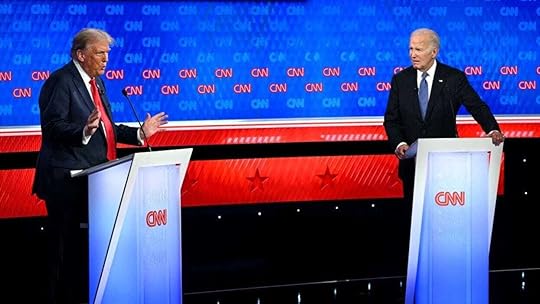
Fascist movements have historically been given an easy ride by liberal democratic governments. Too often, the danger that these movements represent is not recognized until too late, and liberal governments cling on to the belief that authoritarian political actors intent on destroying or undermining democracy are not as bad as they seem to be, and fail to mobilise the forces required to stop them, until it’s too late.
It was the same in Italy and Germany, and now, in the United States, the Democratic Party - always a leaky vessel to carry the hopes of an anti-fascist, anti-authoritarian movement at the best of times - appears to be drifting listlessly into political battle with the gravest threat to the American republic since the Civil War.
This threat was already clear before the events of last weekend. Take Project 2025 - the Heritage Foundation-led coalition of Conservative organizations seeking to develop an transition agenda for a Trump presidency, which has received a lot of media attention in the last two weeks. Among other things, Project 2025 wants to sack tens of thousand of civil service workers and replace them with Trump loyalists. It also wants to take control of the Department of Justice and the FBI; use the military for domestic law enforcement, abolish the Department of Education, cancel climate change research, roll back environmental protections and affirmative action programs, limit contraception and abortion rights - and all this so that Jesus can walk among us once again.
These are plans that would reach into every sphere of American life, and they’re intended to. In a ‘Promise to America’ on the Project 2025 website, Heritage Foundation President Kevin Roberts rails against a vast array of enemies that includes drag queens, ‘critical race theory’, ‘gender ideology’, ‘globalists’, Beijing, ‘left-wing “experts”’, federal bureaucrats, the UN, the European Union, Big Tech, ‘Marxist elites’, ‘Marxist academics’, ‘billionaire climate activists’, and the ‘totalitarian cult known today as “The Great Awokening”’ (has anyone else heard of a movement that defines itself with this term? No, me neither).
As someone accustomed to seeing the left losing, I find it difficult to accept Roberts’s hysterical claim that ‘every hour the Left directs federal policy and elite institutions, our sovereignty, our Constitution, our families, and our freedom are a step closer to disappearing.’
Such assertions owe more to Richard Hofstadter’s ‘paranoid style’ than anything approaching reality, and Project 2025 is a Christian nationalist blueprint for what would effectively be the authoritarian takeover of the US government, using the corrupt criminal-rapist and Putin stooge Donald Trump as its chief instrument.
Heritage believes that Trump won the last election, and it has also accused the Biden administration of using ‘multiple forms of federal power’ to influence the election in November. The executive director of Heritage’s Oversight Project has declared that ‘as things stand right now, there’s a zero percent chance of a free and fair election’ and the organization is already contemplating legal action in the event that Trump loses.
There was - even before the Pennsylvania shooting - a very real possibility that he might not lose it, and if Trump wins, this will not be a freakish aberration like his first administration, making up policy on the hoof. It will be a vengeance government - an all-out, more ideologically-focussed assault on all the institutions that hold executive power to account, supported by organizations like Project 2025.
It will entail deportations of millions of immigrants, and the unleashing of massive police/military power against immigrants and minorities. Outraged by Biden’s policy on Gaza? Last November, the New York Times reported that Trump and his sinister former aide Stephen Miller plan to deport any foreign student who takes part in a pro-Palestinian demonstration. Other immigration proposals include the establishment of deportation camps in Texas, the removal of grants of temporary protected status for people from unsafe countries, and - of course - a militarised ‘wall’.
All this is part of what Kevin Roberts recently called ‘the second American Revolution, which will remain bloodless if the left allows it to be.’ And now someone has shot at Trump, killed one person at his rally, and seriously wounded two others, and the MAGA movement has been foaming with disinformation and conspiracy theories blaming it on ‘Antifa’ and the left.
There have also been some leftwing theories floating around, mostly of the ‘false flag/staged variety’, but this has been gold for the Trumpies. One US congressman claimed that ‘Biden ordered’ the shooting. Hillbilly elegist and now Trump’s Vice President JD Vance tweeted:

That’s a man who knows who he needs to please. No Democrat has ever suggested that Trump should be shot, and there is nothing, literally nothing, to suggest that Democrat ‘rhetoric’ led to Trump’s attempted assassination. In 2022, when Nancy Pelosi’s husband Paul Pelosi was nearly beaten to death with a hammer, Vance insisted that the assault on the Speaker of the House of Representatives’ husband should not be made into a ‘political issue’.
Yet here he is, making an entirely spurious ‘political issue’ out of the Trump shooting, to advance himself. What a guy. It’s also worth recalling that in 2022, many Republicans, including Trump’s son, laughed at what happened to Pelosi:

Republicans, including Trump, have opposed all forms of gun control, including controls on the weapon used to shoot at Trump. For years, the conspiracy theorist and MAGA spokesman Alex Jones - a man who supported Trump and was supported by him - tormented the parents of the Sandy Hook massacre by portraying them as ‘crisis actors’ whose children had not actually been killed.
No leading Republican has ever criticized Jones for this egregious cruelty, because the MAGA cult does not extend any empathy or compassion to anyone beyond itself. This is a movement that has seethed with hatred and cruelty since its inception. It talks constantly about civil war and coups, of hanging and shooting governors. Its members joke, as the QAnon general Mike Flynn did in 2021, of going to Washington and ‘shooting somebody.’
Yet now they blame the Democrats, and the ‘left’ for what - as far as we know - appears to be another freakishly horrific and unfathomable incident in America’s dark history of random violence and political murder. And they aren’t the only ones. Ayaan Hirsi Ali was at on Substack. Over here, Nigel Farage has blamed the attempted assassination on liberals and left, first as a guest on Kuenssberg’s show, and now in the Telegraph, where he can be found imploring ‘the left’ to ‘think very hard about how they seek to play politics.’
Javier Milei has done the same in Argentina. Ditto Gert Wilders in the Netherlands:

We shouldn’t be shocked by such gaslighting. This is what this movement has always done and will always do. It fights dirty, because it is dirty. It lies, because if it told the truth about almost anything, it would have no reason to exist. It has made this clear many, many times, and yet the Democratic Party leadership doesn’t seem to have grasped how dangerous it is.
It it had, it would not heading for the election led by a candidate who the polls continuously demonstrate is a political liability. This was already clear even before Biden’s calamitous debate performance, and his latest ‘gaffes’ at the NATO conference, but it will become even clearer from now on.
America stands only less than four months away from the most consequential election since Abraham Lincoln won the presidency in 1860, and there is a very real possibility that the Democrats might lose the election because of its leader. Of course, in a normal world, this shouldn’t be happening. In a normal world, the Republican Party’s wild embrace of sedition and authoritarianism would write it off the electoral map.
But that world no longer exists. And in these circumstances, it should be all hands on deck for the opposition, with a mass electoral movement pulling out all the stops to prevent the brazen power grab that is now unfolding.
Of course it is entirely right that leading Democrats, including Pelosi and Biden, should condemn the Trump assassination attempt - the aim must always be to defeat Trump politically and legally, not shoot him or celebrate the fact that someone shot at him. But let no one think that emollient calls for ‘unity’ and ‘healing’ and respect will have any impact on Trump and his followers.
This is not a movement that can be persuaded into behaving respectfully. That’s not the game they’re playing, and even though I recognize why politicians have to make such appeals, being nice to them will not make them nicer.
Thanks for reading Matt Carr’s Infernal Machine! Subscribe for free to receive new posts and support my work.
What is needed is an all-out mobilisation of voters who will not allow this movement to take power again. And in America, the figure of the president - whether we like it or not - is central to that movement.
Of course it shouldn’t be the case, but in an age of telepolitics, infotainment and social-media driven political outcomes, it matters what the president looks like, and sounds like, and how he or she communicates to the electorate. If you want a mass mobilisation - even on an electoral level - you need a leader who can ignite a mass movement and speak to it with the urgency required, as Obama once did.
BidenJoe Biden is not that man. Once again, in normal times, faced with a brazenly corrupt presidential candidate who is a convicted felon, rapist, and seditionist with dozens of criminal charges hanging over him, who lies with every breath he takes, the age and acuity of his opponent would be a minor consideration.
But that is not America in 2024, and the reality is that even before last weekend, Trump’s charges had barely affected his position in the polls, whereas Biden’s glazed nightmare of a debate had affected his already low standing, and the fact that he and his closest aides seem to have been lying and trying to cover it up have not helped.
There is some debate about whether Biden once said back in 2020 that he would only run for one term. But there is no doubt, that in a speech in Michigan, in March 2020, he said, ‘Look, I view myself as a bridge, not as anything else. There’s an entire generation of leaders you saw stand behind me. They are the future of this country.’
This is exactly what should have happened. Biden did amazingly well in 2020, managing to defeat Trump in the midst of a pandemic, through a campaign that was largely waged from his basement. But perhaps that basement protected him, because now Biden is two points behind Trump in Michigan - a state he must win -and that new generation of leaders has not emerged, and the more Biden appears in public, the less Americans seem to trust him.
Had Biden announced that he would only serve one term, that search for a successor could have taken place, and Biden would have gone down as the caretaker president who restored something like normality after the pandemic, who helped bring back competent government, presided over a robust labour market, widened access to affordable healthcare, increased spending on renewables, and other achievements that contrasted radically with the mayhem of the Trump years.
I know that Gaza - rightly - has lost him votes in some quarters, but Gaza has not been the decisive issue in Biden’s failure to cut through.
Competent government hasn’t improved his overall ratings - something Labour should take note of. This might be unfair, but politics is unfair, especially when dealing with opponents for whom notions of fairness, integrity and basic decency are alien concepts. And the result is that, even before last weekend, Biden was poised to lead his party to a defeat that his country can ill afford, and which the rest of the democratic world cannot afford either.
Because if Trump wins, it will unleash a toxic tsunami that will galvanize similar ‘take our country back’ movements across the world. And the fact that this outcome should be decided by a political contest between a criminal madman and an old man who appears to be in the midst of serious cognitive decline is a tragic failure of politics. Some readers may be old enough to remember when Leonid Brezhnev was believed to be in a coma during the tv appearances in the last years of his life. The historian Roy Medvedev later claimed that he was clinically dead, between 1976, when he suffered a stroke, and his death in 1982.
In those days, many people saw the gerontocratic rule of the last Soviet years as the tragi-farcical symbol of a disintegrating system. But then, Ronald Reagan was diagnosed with Alzheimer’s in 1994, and some claim that his mental decline was already evident at various points during his two terms in office.
Unlike the Soviet Union, the US didn’t disintegrate. But Reagan was not running to be the next president. His ‘gaffes’ could be concealed, just as Biden’s have - until recently. But now, his obvious decline is a problem for his party and his country. Even the Heritage Foundation now see Biden as a liability - which is why they are reportedly looking into ways to prevent the Democrats from replacing him.
I don’t say this with any pleasure, but in these cruel political times, many of Biden’s enemies will take pleasure in every mistake he makes. In a single debate he has provided material for endless memes and video clips that he cannot come back from, in a performance that made the mad liar Trump seem almost statesmanlike. And now Trump has been shot, and that image of his bloodied ear, pumping fists and the American flag will be used over and over again - Trump the martyr, saved by a miracle, maybe by God; Trump the indomitable fighter who the deep state couldn’t kill, who did it all for America.
Objectively, Trump remains what he was before Pennsylvania: the felon, the seditionist, the corrupt authoritarian megalomaniac, the liar and fraud. But now he has been saved by God, and Biden can barely remember the name of his own vice-president.
It remains to be seen whether the shooting boosts Trump’s popularity, but I would be very surprised if it doesn’t, and I cannot see what can boost his opponent’s. Of course, it will be humiliating for Biden to stand down. Many of us will have known parents and grandparents who succumbed to similar decline and struggled to accept it. In Biden’s case, stepping down will take bravery, but it can be done and it should have been done before.
After all, if Biden was seriously ill, he wouldn’t run. And what is happening is no less serious. In 2016, the Democrats put a weak candidate into a dog fight, because it was somehow assumed to be ‘her turn.’ Then, they were taken by surprise. Now they know what is coming, but they appear no less complacent, as they prepare to put an even weaker candidate into the ring with the same dog, after ignoring all the warning signs that this was not likely to go well.
We can only hope that those with the power to do so can bring this cruel spectacle to an end. Because the stakes are too high to allow one fragile old man to bear the weight of his sinking country.
For all these reasons, the Democrat leadership needs to step up, and take whatever action is required to make Biden step down down.
And if they don’t or can’t do that, they will not be forgiven. And this may well become one election that America cannot come back from.
Thanks for reading Matt Carr’s Infernal Machine! Subscribe for free to receive new posts and support my work.
July 9, 2024
The Tories Ride Out
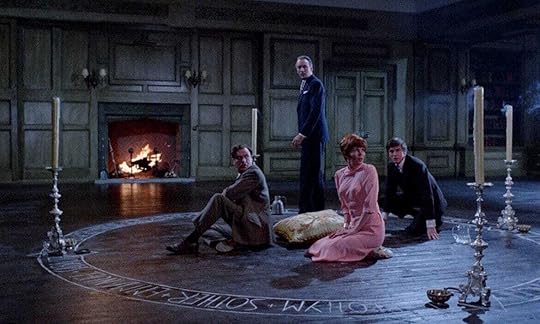
Like many readers of a certain age, I used to read Dennis Wheatley novels and watch Hammer horror films in my youth, and there was a time when I was scared rigid by Terence Fisher’s 1968 film of The Devil Rides Out - well I was only thirteen. It’s the usual Wheatley schlock - good Christian aristocrats waging war against Satan and saving damsels in distress from the powers of darkness, but it was well done. The special effects were great for the time; Christopher Lee took time out from Dracula in a rare good guy role as the noble Duc du Richlieu, incanting occult mumbo jumbo with a conviction that few other actors could pull off; Richard Matheson wrote the script, and Charles Gray was a menacingly silky Mocata, the ‘devil’s chief disciple’ with the burning blue eyes and psychic powers.
In the culminating sequence, de Richlieu and his pals - including the late Paul Eddington from The Good Life of all people - have to spend the night inside a magic pentacle while Mocata hits them with the full Satan. Giant spiders, the Angel of Death on a horse - it’s a rough night for our heroes, but they hold the line. Mocata is sentenced to eternal damnation, and after the storm of cosmic battle, comes the misty dawn. Everyone is saved, and de Richlieu tells his pals that ‘Time itself has been reversed for us…all these things happened, but now, they have not happened. We are better. We are safe again. ‘
I wouldn’t want to establish an exact parallel between this hokum and the night of 4 July. For starters, it would be giving way too much credit to the Sunak government to suggest that it was driven by the powers of darkness. But elections can sometimes feel like a political exorcism, and for millions of people, this was the night we had all been hoping for for a long time, while never really believing that it would actually happen.
For 14 unutterably dismal years we have all been trapped in the haunted house of Tory, wandering down its gloomy corridors to the sound of clanking chains, banging doors and deranged laughter echoing down the hallway. But last week, like the dinner guests in The Exterminating Angel, we remembered that we could actually walk out of it, and we brought one of the most crazed, cruel, shameful and corrupt periods in British political history to an end.
No magic incantations were required. All we had to do was scratch our cross in enough ballot boxes and they were gone. And who, but the most jaded among us, could not take some satisfaction at seeing the departure of Ben Bradley, Gullis, Rees-Mogg, Truss, Brendan Clarke-Smith, Therese Coffey, Simon Clarke, and so many others cast into the void from which they should never have emerged in the first place?
Whatever reservations you may have about Labour - and I have more than a few - a 326 majority was only very recently the stuff of dreams. I was pleased to see the Greens gain 4 MPs - Carla Denyer is an extremely impressive successor to Caroline Lucas. The Liberal Democrats wrecked the Tories in their heartlands, and whatever they do in opposition, that is in itself a great service.
And yet, waking up in the early hours just in time to watch Truss lose felt strangely joyless. When Corbyn took Theresa May’s majority from her in 2017, I felt euphoric because it was so unexpected.
This time, everyone knew in advance what was supposed to happen, and the main emotion that I felt was relief that the nightmare we have all been living through was over, and that a kind of political justice had been meted out. But once the schadenfreude had worn off, the implosion of Toryism didn’t feel like the cathartic moment it should have been.
This was partly of what preceded it. Because unlike The Devil Rides Out, time has not been reversed. The last 14 years have happened, and it will take more than an election to wash their taste away or repair the damage they have caused. And then there was the Reform Public Limited Company. I know they only got five seats - less than the 13 predicted by the exit polls - but they did get a substantial vote share - 3.9 million votes in total - and had that not been the case, the Tories might have held onto close to 98 seats.
They still would have lost, of course, but the fact that they got this far - with assistance, not for the first time, from Russian bot factories - is worrying, and in the current international climate it would be very foolish to dismiss the dangers that this far-right bridgehead now represent.
A number of commentators, including Neil Mackay and Anne Applebaum, have hailed Labour’s victory as a defeat for populism. That interpretation feels far too premature to me, and not a little lazy, and not only because of its inane equivalence between Corbyn and Farage.
Firstly, it is by no means clear that rightwing national populism has been defeated in this country. The Conservative Party has been crushed, for sure, though to a large extent, this is due to its own stunning incompetence rather than its populist mimicry. And Farage and his gang - the genuine article - have actually done quite well out of the Tory collapse, and are poised to do even better. They won’t like the parliamentary straitjacket, and won’t achieve much within it, but Farage has already promised to build a ‘mass national movement’ that will enable them to fight the next election ‘properly.’
That is worrying, because Farage is an extremely effective, albeit malignant, campaigner, and he will have a lot of dark money to help him drag the Tory Party rightwards, and now he has the chance to take it over or form some kind of Reform/Tory pact.
And who would put any faith in the remaining ‘moderates’ to stop this and lead the party back to the path of virtue, such as it was?
On the positive side, the egoism, narcissism, factionalism, and general incompetence that has destroyed Johnson’s majority could mean than the Conservatives spend years ripping themselves to pieces, and for all Farage’s arrogance, Reform is riddled with despicable characters who may struggle to make headway beyond their racist/nationalist comfort zone.
Already their MPs and voters are complaining about the unfairness of FPTP, and how it doesn’t express the ‘will of the people’ - which of course, only ever expresses itself through them.
There would be no hope for the UK if a party like this ever came anywhere near power, so we should be grateful that the maths are what they are, but progressive governments shouldn’t be relying on mathematics. Unless the Democratic Party awakes from its complacent torpor, there is a very good chance that Trump will win a second term in November, and if that happens it will inspire and energise similar movements in countries across the world, including here.
Thanks for reading Matt Carr’s Infernal Machine! Subscribe for free to receive new posts and support my work.
Putin will do everything he can to facilitate that outcome. If Trump wins, then it is very likely that Ukraine will lose, and every national populist around the world will be celebrating. So as much as we all want to feel hopeful and optimistic after an election, we don’t have the right to ignore these possibilities simply because we want to feel better, because we are not out of this.
It is ludicrous, for the likes of Andrew Marr to say that we are now a ‘little oasis of peace and stability’ simply because of a change of government. There has been little or no reflection on how this country became the madhouse it became over the last 14 years, either amongst the politicians or the voters, because some traumas are too painful to acknowledge.
Yes, it is reassuring to know that there are now more than 500 MPs in parliament who, whatever their particular political orientation, will never be friends of the Tories or Farage. Starmer’s commitment to public service may lack the grand vision of a different society that many of us would like to see, but a starving patient needs thin gruel to be able to walk again.
It is a refreshing novelty after so many years, to see people entering government who do not resemble a pack of monkeys running a space station, who you feel are there on merit and not simply because of their deference to the leader. Already, the ludicrous and hateful Rwanda policy has gone.
But competence and service can only get you so far. These commitments haven’t worked for Biden, and they won’t necessarily work here, without significant and tangible improvements in peoples lives. Starmer has said that he wants politicians to tread less lightly on our lives, but this country needs more government, not less.
Last weekend, I spoke at a mosque in Harrow that provides meals to seventy families every weekend. On my way there, I passed three homeless men sleeping under blankets on a strip of waste ground while the rain poured down on them. These problems cannot be addressed simply by housebuilding programs and ‘creating wealth in every community’.
We have plenty of wealth, but most of it remains concentrated in the hands of very few people. It is not utopian to seek alternatives to this. Sooner or later, we need a debate about inequality and distribution.
Starmer’s achievement in reversing the calamity of 2019 in only five years cannot be dismissed, but had the last three Tory governments not been so staggeringly awful, there might have been a very different outcome. And the ruthless authoritarianism with which the Labour Party purged the left has driven out voices that could and should have been present in debates over the coming years, from Corbyn to Faiza Shaheen.
If Labour insist on marginalizing the left, and if they try to outflank the right, particularly regarding immigration, they will fuel and legitimize the real thing, just as Blair and Brown once did. And if that happens, then the shallowness of last week’s majority may well become apparent more quickly than we think.
Consider what has just happened in France, where a Green-left coalition formed only a few weeks ago has destroyed the National Rally’s chance of forming a government. That is an example of what the left can do, when it gets it act together. This is clearly not the outcome Macron wanted when he made his gamble, but whether he likes it or not, the New Popular Front has done what the centre could not do - it has pulled off a stunning mobilisation that has stopped Le Pen in her tracks.
There are still huge difficulties, regarding the kind of government that comes out of this, but for the time being, c’est magnifique, and let’s not pretend that left and right in this context are simply expressions of populism.
For the time being, progressive politics has gained a foothold in France, and the same thing has happened in the UK, albeit in a very different context. Because unlike France, what has happened here is not a popular mobilisation. It is not even an endorsement of the Labour Party, as such, but the expression of an exhausted and disgusted electorate that could stand any more torment.
It remains to be seen whether we are able to use this opportunity to climb upwards, or whether it is simply another step in our collective descent. But there are possibilities here that were not present until last week. There are now constituencies that can make themselves heard, that had no influence whatsoever on any of the governments of the past 14 years.
We can’t say, like the Duc de Richlieu, that we safe again. But we are a little bit better than we were before, and now we can hear the strains of la Marseillaise drifting across the Channel, and we should take heart from the knowledge that the rise of ethnonationalism is not inevitable, that politics can still achieve great things.
It’s up to our new government to continue that trajectory, and it’s up to all of us to do everything we can to see that it does.
July 2, 2024
Annihilation Day
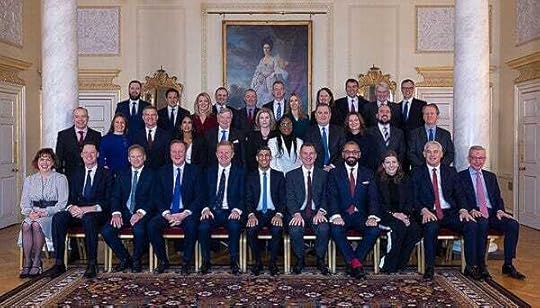
In two days time, the British electorate will finally get the chance, not merely to throw a Conservative government out of office, but to deal a potential death blow to the Conservative Party. The first of these possibilities belongs to the normal wheel-of-fortune of British politics, in which long-serving Tory governments finally become so brazenly corrupt, incompetent, and exhausted that even the people who voted these governments in can no longer stand them.
The second is an entirely new opportunity, that neither I nor many people of my generation ever expected to see. After all, we are talking about the most successful political party in the Western world, a party that has won eight out of the last 11 elections, and which has been power - alone or in coalition - for more than eighty out of the last 100 years.
Yet now here it is, after one of the worst electoral campaigns in its history, poised, according to the polls, to embark on a bleak journey through a political wilderness as barren as anything British Conservatism has ever known. For all of us who are painfully aware of the Conservative Party’s political ruthlessness, campaigning acumen, and ability to continually re-invent itself, the current campaign has been staggeringly and even bewilderingly inept - a fever dream that sometimes feels as if everyone responsible for it has stumbled on bad street drugs.
Not long ago, it would have been impossible to imagine a Tory MP betting on his own defeat, or a Tory Prime Minister who flew home early from a D-Day anniversary and could not even summon up the courage to sack employees and ministers betting on an election that he called, and whose concept of public debate was based on shouty interruptions and petulant disdain.
Who, even a few years ago, could have predicted that a Conservative electoral campaign would produce failed school projects like this?

Or this?

There was a time when someone who knew what they were doing would have told Sunak that this was not what he should be doing. But now such people no longer exist in the party which only five years ago won a majority that ought to have sustained it in power for at least two or three terms.
The most obvious explanation for this stunning collapse is the man who became prime minister in 2019. Admirers of Boris Johnson - and there are still more of them around than there ought to be - like to attribute his grubby implosion to a ‘witch hunt’, a ‘coup’ or the supposedly trivial preoccupation of the media and the public with ‘cake’ as a distraction from the serious business of government. But Johnson’s downfall was actually the clearest demonstration of how far his depraved administration had strayed from any conventional notion of serious government.
Thanks for reading Matt Carr’s Infernal Machine! Subscribe for free to receive new posts and support my work.
Many people - including Tories - warned beforehand that Johnson was unfit for office. It was entirely in keeping with Johnson’s career trajectory that his administration was brought down by the indolence and moral incontinence that gave us a tawdry version of the Masque of the Red Death acted out by the Tweenies, played out in 10 Downing Street with a supporting cast of non-entities who owed their presence there to their loyalty to him. Simon-not-on-the-Case once called Johnson’s administration a feral government, but Partygate was too grotesque and idiotic to justify what was really a continuation of Johnson’s Bullingdon Club by other means - all takeaway booze, karaoke, pub quizes and vomit on the carpet.
In normal times that would have been bad enough, but coming out of the pandemic it constituted a savage mockery of the sacrifices made by a population that largely followed the rules Johnson’s government imposed, without realising that those who introduced them did not feel not bound to follow them.
This debacle was followed by the smirking stupidity and reckless fanaticism of the Truss/Kwarteng tandem, before the Tories inflicted yet another dreadful prime minister on the country in order to avoid having to face the electorate. One after another, these were administrations that covered the nation in shame and dishonour, and trampled on the most basic notions of accountability, honesty and basic competence that make democratic government possible.
For the last two years, Sunak’s hapless administration has tied his government’s fortunes to the Rwanda policy - an immoral fantasy that has no prospect of succeeding even in its own sordid terms. Now, Sunak has finally placed his government’s head in the slavering mouth of the British electorate, without even having giving his cabinet a chance to comb its hair.
Such ineptitude is jaw-dropping to the point when it almost defies rational explanation. Many commentators have pointed that all these post-2016 Tory governments have been Brexiter administrations. They were governments that came to power by promising, in different ways, to deliver the undeliverable and realise expectations that could not be met, following a referendum whose practical consequences few of them understood or appreciated, with negative implications they were too cowardly or dishonest to recognize.
In this quest to make a silk purse from a sow’s ear, it was necessary to eliminate or dismiss any residual expressions of what Karl Rove once called the ‘reality-based community’ within the Conservative Party in order to Get Brexit Done. And so it was that the fanatics, liars and grifters took over the Tory Party and reduced its once formidable electoral machine into the political equivalent of Hal the computer in 2001 A Space Odyssey, .
But this intellectual and political corrosion was already evident before the Brexit madness overwhelmed the Tory mind. Serious governments do not risk their country’s economic and political future by reducing its options to a yes/no referendum. Cameron agreed to this in an attempt to fend off his party’s extremist fringes, only to see it taken over by them.
Good riddance, you might say. Except that we have all been living with the consequences of this insouciant selfishness. In the New Republic, James Robins has written a devastating summary of the social ruin that successive Conservative governments have inflicted on British society since 2010 - and also during the Thatcher years. The near-collapse of the NHS, child poverty, food banks, wage stagnation, municipal bankruptcies, deindustrialisation, underinvestment in public services, inequality, nepotism and corruption, the gratuitous social cruelty of austerity - all these are the consequences of 14 grim years that have finally reached the point , when even Tory voters now flee from the party that onetime did they seek.
The Centre Cannot HoldThis ought to be a cause for celebration, and perhaps it would be, if the main political opposition party was able or willing to offer a genuine alternative to this cascade of calamities. It is more than a little unsettling and disheartening, given the scale and depth of our self-inflicted national wounds, that the main beneficiary of the Tory collapse is a timid right-wing Labour Party that barely dares say boo to a goose - except when it comes to its authoritarian purging of the left.
Starmer’s admirers like to present the turnaround in his own party’s fortunes as a testament to his political skills, and they aren’t entirely wrong. But his ruthless and often cynical purges have transformed Labour into a party that is in its own way, as hollow and soulless as the party it is preparing to defenestrate. Because elections are win by appealing to voters from outside your political comfort zone, it is equally true that the systemic failure which underpins our succession of political failures cannot be overcome by temporary electoral coalitions based on shallow notions of stability and managerial competence.
Even if the polls are correct, and Labour gets its majority, the UK is likely to remain firmly mired in the neoliberal vice that has squeezed it over the last four decades, in part, because no Labour government will attempt to challenge it. In pointing out these limitations, I am not adopting a sectarian or ideological position. I don’t agree with the ‘don’t vote Labour/vote for a real socialist’ sloganizing.
I hope Corbyn wins in Islington and that Faiza Shaheen takes Chingford and Woodford Green. I hope the Greens do well, and the Liberal Democrats too. I hope Reform does well - well enough to weaken the Tory vote but not gain more than a handful of seats. But if voting for a real socialist means voting for George Galloway, I’ll pass, thanks. And in most cases, voting for a real socialist means, in terms of its practical outcome, that you get a Tory. After the last 14 years, that is a luxury this country can no longer afford.
Nor is it much use arguing that Labour are as bad or even worse than Tories. No one can say that, at least not yet. Even a right-wing Labour Party has to answer to constituencies and organizations that the Conservative Party can’t reach, and which make it possible to exert political pressure on the leadership to be better than it wants to be.
At the same time, no voter is obliged to accept Labour’s anaemic alternative to Tory misrule and simply shrug their shoulders. Progressive government requires courage, vision, and a willingness to fight the fights that must be fought. If democratic politics can’t provide concrete improvements in people’s lives, address common crises coherently, and strengthen the bonds that make democratic society possible, then voters will turn away from democratic politics and fall into the embrace of political predators whose interest in democracy is perfunctory at best.
This is already happening in country after country. A few decades ago, few people would have imagined that the party of Abraham Lincoln could have become the corrupt, treasonous, conspiracy-riven madhouse that it has become in little more than a decade. After the turmoil of the Brexit years, it would be naive and foolish to discount the possibility of a similar outcome here, let alone rely on illusory notions of common sense and moderation as supposed hallmarks of the British national character.
Already, Farage is circling the Tory ruins with his usual cunning and malevolent charlatanry, staging Trumplike mass rallies and espousing fake-victimhood to stab-in-the-back voters who still want their country back and can’t understand why their Brexit feast has turned into a dog’s breakfast. It’s not for nothing that Farage has focused on Clacton - one of the most deprived areas in the country. These are the waters that he will try to walk on, blazer and striped suit and pint in hand, flush with someone else’s cash, and reader, it’s not because he cares about the people of Clacton.
No one should be surprised that Leave voters are now appealing to the same man who did so much to bring about the Brexit they voted for, and now find, they don’t like. He will never take responsibility for its failure, and nor will they, because living in the land-of-someone else’s-fault means never having to say you’re sorry, whether you’re a voter or a politician.
At present, Reform UK Party Limited - a name to set any nationalist heart on fire - is poised to scrape up some 16 percent of the vote. That might only gain them a few seats and hasten the Conservative Party’s collapse. But if Labour wins and then fails, then we could well be looking at a very different political outcome in five years time, much like the one that Macron is experiencing right now.
Labour’s own resurrection is a symptom of the same volatility that can also bring down a Labour government, and usher in something worse. And it’s precisely in these unpromising circumstances, that we have the right to demand more from our politicians.
Because whatever doubt or disgust you or I may have about the Starmer project, we can still vote tactically to hasten the destruction of the Conservative Party, and we should take advantage of that opportunity wherever it presents itself. Rarely has a political party deserved oblivion as much as this one, and if you can’t feel hope or optimism about Labour, then remember that there will never be any hope at all under this party-of-the-damned.
So if you can’t vote with your heart, then vote as an act of vengeance and just retribution. Make it a dish served up cold. Vote through gritted teeth. Vote for all those who died during the pandemic who might have lived if a different government had been in charge. Vote because that same government handed out millions to their mates through the VIP PPE lane.
Vote for the 2.99 million people who used foodbanks last year, who should have had enough money to feed themselves. Or the 1,560 people who died between 2014 and 2017 within six months of being found fit for work. Vote for the library you don’t have; for the hospital appointment you or someone you know can’t get; for the patients who died because ambulance services are on the verge of collapse; for the youth services that were cut by 73% percent between 2010/11 and 2019/20. Vote for the 82-year-old cancer patient who slept in a hospital corridor for 46 hours while waiting for a scan.
And if you still have any doubts, and want to sit this one out, think of the procession of hard-faced liars and incompetents who have passed through our tv screens these last few years and imagine them in power for even another day. Remember Cromwell’s message to the Long Parliament in 1653:
It is high time for me to put an end to your sitting in this place, which you have dishonoured by your contempt of all virtue, and defiled by your practice of every vice; ye are a factious crew, and enemies to all good government; ye are a pack of mercenary wretches.
The current government is no less factious, no less mercenary, no less injurious to good government. It too, has become ‘intolerably odious to the whole nation’ and we desperately need to be released from its suffocating grip. We need the party gone that has inflicted these calamitous governments on a country that should have known better, and which has discovered - too late - what Conservative Britain means in practice.
What comes next remains to be seen. It may very well disappoint. But for now, there is only one thing to be done. Go down to the polling station. Put your cross in the box. Do it with a song in your heart or scratch it out with a bitter taste in your mouth.
But do whatever it takes to get rid of this contemptible rabble. Settle back on the sofa, and watch the seats fall, one by one. And when that’s done, we can fight the fights that must inevitably be fought, and bring what pressure we can on the next government, and see if it is still possible to build a society that can live up to its better instincts, after so many years of succumbing to its worst.
June 25, 2024
Old Post: Freaky Friday

We have just passed the eighth anniversary of the June 23rd Referendum, and no one will be surprised that the British political class has not taken advantage of this anniversary for a moment of reflection, let alone celebration. Such remembrance is in anybody’s interests, not the Conservative government, or the Labour opposition, or even the loathsome political grifter Farage, who now appears on our tv screens day after day.
Celebration is out of the question. And polls suggest that the British public is in no mood to celebrate it either. So we find ourselves in the strange situation in which even the architects of this debacle are largely silent, and if they open their mouths at all it is usually to lie or make fatuous reference to our ability to govern ourselves. Meanwhile Brexit lies beneath the surface - a phantasmal trauma that no one dares acknowledge and yet still shapes the national neurosis. An act of idiocy that we cannot revisit without recognizing that it was an act of idiocy.
Brexit has destroyed the Tory party. And that wreckage has given Labour the gift - according to the polls - of the biggest majority it has ever had - a gift that it has not earned and may struggle to justify.
And incredibly, the sleazy pub bore grifter who did so much to bring about the Leave victory is poised to enter parliament, and may even join the Conservative party that he has helped destroy.
It’s difficult to know what to say about all this, so I offer you the piece that I wrote on June 25th, 2016. Some of its predictions have not been realised - bearing in mind the observation attributed to Chou en Lai that more than 150 years after the French Revolution it was still too early to say what its influence have been.
Others have. But prophecy has never been my forte. I offer this piece merely as one person’s response to what seemed to me at the time a grotesque and tragic folly that the country would live to regret.
Nothing that has happened since has done anything to change my mind.
In the Jamie Lee Curtis comedy Freaky Friday, a mother and teenage daughter wake up to find themselves trapped in each other’s bodies as a result of a magic spell. Yesterday, I underwent a similar but even more disturbing transformation. On Thursday night I dreamt that Remain had won the referendum. Early on Friday morning I woke up to find Nigel Farage crowing about ‘Independence Day’ and celebrating a victory for the ‘real, decent people.’ Over the next twenty-four hours, along with millions of my unreal and indecent fellow-citizens, I found myself trapped in a country that I didn’t want to be in, facing a horrible future that I couldn’t escape from.
No one can say the country was in good shape before Brexit. Large swathes of the population were clearly not doing well. Food banks; zero hours contracts; worsening labour conditions; wage stagnation; cuts and atrophied public services; pressure on schools and GPs surgeries; high rents and ‘social cleansing’; gross social and regional inequality; a lack of affordable housing; a succession of paedophile scandals involving high-level institutional collusion; and the near-collapse of the British steel industry – it wasn’t Shangri-la and it wasn’t Jerusalem.
At the same time, the country wasn’t exactly hell on earth. It wasn’t in recession. Unemployment was at a 10-year low (even if that outcome was partly due to a rise in part-time work and austerity-induced precarity). Our much-loathed immigrants came here to work, not in order to drain the nation’s bodily fluids, and they did so because there was work available. Contrary to what many of us have been told, their presence, according to a 2014 UCL study, was good for us too, providing a net gain of £20 billion to the country’s public finances.
Northern Ireland was not at war with the British government or with itself, partly because of the money that the European Union provided to the region through the EU Programme for Peace and Reconciliation and other structural funds. As a result of Thursday’s decision, none of that can be taken for granted. We now face the possibility of a national and possibly international recession, at a time when the global economy has barely recovered from the last one.
We are likely to witness the breakup and collapse of the United Kingdom; the secession of Scotland; the disintegration of the European Union on terms set entirely by the far-right. We might also see the collapse the Irish Peace Process and the Belfast Agreement, as EU funds disappear and the reappearance of Ireland’s neutral border reopens sectarian divisions that have been held in abeyance for nearly two decades.
After decades of painstaking agreements and negotiations that have made it possible for Britons to live,work and study anywhere on the continent, and for Europeans to do the same here, we now face the curtailment and elimination of these rights. We face years and years of painful negotiations, as a succession of almost certainly weak governments attempt to disentangle themselves from the agreements that their predecessors voluntarily entered into.
Thanks for reading Matt Carr’s Infernal Machine! Subscribe for free to receive new posts and support my work.
No one can say for sure how all this will turn out, but it is difficult to imagine that the clowns who led us into this mess can negotiate their way through its consequences, and there is absolutely nothing to suggest that the final outcome will be worth the massive waste of energy and the turmoil and uncertainty that it is almost certain to engender.
Already their efforts have divided and polarised the nation, after what is perhaps the dirtiest, ugliest and most dishonest political campaign in British history. After decades of moving away from a society that once had signs up saying ‘No blacks or Irish’, this campaign has unleashed and legitimized toxic hatreds, prejudices and expectations that will be difficult, if not impossible to put back in the bag.
Brexiters – both left and right – would like to pretend otherwise – but xenophobia, bigotry, and outright racism have been the decisive components of this referendum, which produced the dramatic shift towards Leave in the last two weeks. The fake promises from Boris Johnson to ‘heal’ the nation – the same Johnson who profited politically from Farage’s dogwhistling and engaged in it himself – would be laughable if they weren’t contemptible.
This was a campaign in which an MP was murdered because she supported EU membership, supported refugees and immigration, yet more than half the population chose to vote for the exact opposite of what she stood for. Faced with arguments from Nobel Prize-winning economists and political scientists who warned of the calamitous consequences of Brexit, they chose to follow instead a motley crowd of mountebanks, chancers, ideologues and demagogues who engaged in what legal expert Michael Dougan called “dishonesty on an industrial scale”.
These same politicians told the public not to believe in the ‘experts’, and when their arguments came apart they coolly, cynically and wilfully stirred up fear and hatred towards everything foreign, whether it was ‘bureaucrats in Brussels’, rapist refugees, Turks, or immigrants in general. It’s clear that some of those who listened to this siren song are already beginning to regret it. Even Cornwall, which voted to leave, is now asking for the government to replace their EU fund. They won’t be the only ones, when other regions discover that the EU actually gave them money as well as taking it.
For all the Christmas hamper promises that Brexiters made during the campaign, there is about as much chance of bailouts from the gaggle of right-wing libertarians and Tory free market zealots who brought you Independence Day as there is of snow falling in the Sahara. It’s also questionable whether there will even be much wealth to redistribute. China is already looking askance at further involvement in the UK financial services industry. The EU has made it clear that the UK won’t get the same access to the single market that it had before.
The creepy fraud Farage has already been rowing back on the campaign promise that the EU’s mythical £350 million per week will go to the NHS. Those pensioners who voted in such high numbers for Brexit may well see their state pensions decline. And as for immigration – that great obsession of the British public, don’t expect miracles there either.
Many of those who voted Leave imagine that the 13 percent of the population that is immigrant will miraculously vanish. But if ‘control’ over immigration means bringing numbers down to the ‘tens of thousands’, that won’t happen unless Britain withdraws from the single market. Even then it will require more draconian enforcement measures than those we already have to stop people coming and strip the rights from immigrants who are already here.
Expect tougher restrictions, curtailment of rights, exclusionary practices. Expect an escalation of immigration raids, deportations, detention, ID checks etc, so our newly-independent nation can make that distinction between insiders and outsiders, natives and aliens, absolutely clear.
We might also expect an increase in street-level violence as the openly fascistic and belligerent chauvinists who welcomed Brexit see their hatreds legitimized. There is also likely to be more anti-immigrant scapegoating as ever-more embittered sectors of the population watch the economy nose-dive and their Brexit dreams turn sour. We can expect an increase in verbal and physical attacks on people of colour and people with foreign accents who aren’t ‘like us.’
One of the great lies of the Brexit campaign was the notion that a post-Brexit government would welcome immigration from outside the EU – a promise that ignored decades of legislation intended to prevent entirely that outcome. No one should hold their breath and expect this phony cosmopolitanism to be realised any time soon.
This is what we voted for on Thursday, even if we didn’t know it, thanks to a reckless gamble carried out by the most useless and destructive prime minister in the history of the country, a PR man who epitomises the arrogance and fecklessness of the British ruling class.
Some historical tragedies and catastrophes are inflicted by others. Like an invasion by a foreign army, say. Others are the result of specific decisions taken from a set of options and possibilities that were also available. The British public did not have to do what it did on Thursday, and I suspect that historians in the future will ponder for many years the massive wound that the electorate inflicted on itself, and will struggle to understand rational reasons for that choice.
Some have described the triumph of Brexit as a victory of the ‘quiet people’ against arrogant Brussels ‘elites’. Others have characterized it as a rebellion against the ‘establishment’ in this country. Some sections of the left have seen Brexit as a revolt against neoliberalism and austerity. Never mind that the EU didn’t dictate the austerity policies inflicted on the country by two extremist Tory governments that used the 2007/08 crisis as a pretext for an all-out class war and an assault on the welfare state.
Never mind that many of the newspapers and politicians who supported that process are also part of the ‘establishment’ and the ‘elite’ that supported Brexit. As anti-establishment rebellions go, this was the political equivalent of shooting yourself in the head, or wrenching the wheel of a truck because you don’t like the direction of travel, simply in order to drive it off a cliff.
Of course there are many who don’t believe this, who think that Britain has recovered its national ‘destiny’ – as if there is such a thing. The Daily Express – a paper that would have fitted comfortably into Nazi Germany, if you substitute the word ‘migrant’ for ‘Jew’ celebrated the triumph of its ‘glorious crusade’ today. Brexiters may raise their glasses and jeer and tell me and others to leave the country – I expect that we will hear a lot more of this kind of talk in the months and years to come.
Lexiters may dream of a brave new world of internationalist struggle, but I see nothing good whatsoever about the decision that was taken on Thursday and the politics that made it possible.
“Make good choices, ” Jamie Lee Curtis tells her teenage daughter in Freaky Friday. On Thursday, the British electorate made a very bad choice indeed. Some of those who made it will be dead before these dreams and fantasies come crashing down. The tragedy is that millions of people who didn’t make that choice will also pay for it, and will remain trapped inside a country that is now locked into a very bleak trajectory of conflict, disintegration, bitterness and anger that will dominate its politics for decades, and is likely to transform the UK into something nastier than many of us once thought possible.
June 18, 2024
Breaking Bad
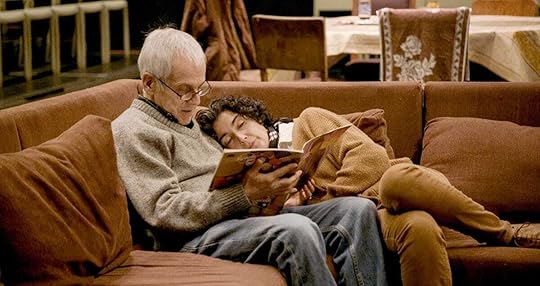
I recently watched the beautiful Chilean documentary La memoria infinita (The Eternal Memory) on BBC Iplayer. For those who don’t know, it’s an intimate portrait of the late Chilean journalist Augusto Góngora and his wife Paulina Urrutia, as Góngora slips into Alzheimer’s. Much of it was shot by Urrutia during the Covid pandemic, when it was impossible for the camera crew to be in the house.
Thanks for reading Matt Carr’s Infernal Machine! Subscribe for free to receive new posts and support my work.
Alzheimer’s is a cruel disease, but this isn’t a depressing film. Even as Góngora’s world slowly crumbles to the point when he can’t even recognize his own reflection in the mirror, there is so much humanity, humour, love and devotion in their relationship that the film becomes an act of celebration and affirmation of their relationship and the lives they led.
Góngora was a tv journalist with the independent news programme Teleanálisis during the Pinochet regime, which bravely covered aspects of Chilean society that the dictatorship tried to ignore and tried to give a voice to its victims. With the return of democracy, he turned his attention to culture and cultural politics, producing a series of programmes on writers, artists and film directors.
Urrutia is a film and stage actress, a trade unionist and academic, who became president of the National Council of Culture and the Arts in 2006 under the government of Michelle Bachelet. The scenes of the couple coping with the COVID pandemic and with Góngora’s failing memory, are interspersed with footage from their earlier lives and careers, which give you an insight into their broad private and public trajectories.
Both of them, separately and together, lived virtuous lives - in the sense that the concept of virtue was used in the Enlightenment, to describe a sense of moral purpose and public duty and the desire to do good in the world. In Letters XI and XII from the Persian Letters, the philosopher Montesquieu’s imaginary traveller Usbek depicts a mythical Arabian tribe of Troglodytes, whose members acted purely out of ‘savage instincts. Every man determined to do what was right in his own eyes; and in attending to his own interests, the general welfare was forgotten.’
In Montesquieu’s parable, such behaviour brings the Troglodytes to ruin and self-destruction. Only two families escape the collapse of their society, whose leaders
loved their wives, and were beloved most tenderly. Their utmost care was given to the virtuous training of their children. They kept before their young minds the misfortunes of their countrymen, and held them up as a most melancholy example. Above all, they led them to see that the interest of the individual was bound up in that of the community; that to isolate oneself was to court ruin; that the cost of virtue should never be counted, nor the practice of it regarded as troublesome.
La memoria infinita gives you a strong sense of this unassuming but formidable couple, who survived dictatorship, and remained committed to truth-telling, social justice, and democratic politics; who never lost their sense of culture as a source of pleasure, and also as a democratic instrument and a means of deepening and widening our understanding of society and the world; who lived according to the notion that the fate of the individual is bound up with the community.
You see these principles played out in footage of Urrutia in a play about torture during the Pinochet years; of Góngora watching the violent repression of street protests that his tv programme once covered and remembering the people who died to make Chilean democracy possible; of his interviews with Chilean filmmakers and artists; of a book launch on historical memory in which he explains to his audience how the reconstruction of the past is the key to constructing a better future.
This last footage alternates with a painful scene of Góngora during the pandemic, barely able to reconstruct his own past, and fearfully holding onto a handful of books in the belief that someone might steal them. Yet even in these dark hours, the two of them still cherish each other. In other words, these are two ordinary but formidable people, whose lives had a moral coherence that is conspicuously absent in our miserable era of the political grifter, the sociopath, and the headlong race towards the lowest common denominator.
The gilded rapist-felon Donald Trump is the most obvious and most grotesque manifestation of this absence - for reasons too numerous to go into here. But there are so many other politicians like him, who are inspired by him, who exude the same cruelty and malice, the same fanaticism, venality and corruption, the same vulgarity, stupidity and narcissism.
Bolsonaro, Johnson, Milei, Abascal, Duterte - the list is endless. And this dismal procession of monstrosities is made possible by a global movement that includes media outlets like Fox News and GB News, legions of Internet trolls and Youtubers, Katie Hopkins, the Tate brothers and Elon Musk. Crucially, it also includes voters, millions of whom no longer want their leaders to be good, generous, altruistic, thoughtful, or honest, but revel in their lunacy, fakery and feckless viciousness.
This trajectory isn’t exclusively rightwing - there are grifters on the left too, who share some of these qualities. But it is the new ethnonationalist-populist right that has done more than any other political movement to break down the norms and standards that are essential to democratic governance. This is a movement that has turned ‘virtue signalling’ into terms of abuse, that actively promotes incompetents, charlatans, fanatics, petty tyrants and outright crooks into high office in order to further its political goals, and seeks to bully and destroy individuals and institutions that oppose it.
Take this month’s encounter between Doctor Anthony Fauci and the House Select Subcommittee on the COVID-19 pandemic. In a normal world, this should have been an opportunity for US government representatives and the most influential scientist during the pandemic to discuss what went wrong and what right, and how America might better prepare itself for the next one.
But we have left that world some time ago. And so what America got was a stream of hostile Republican ‘politicians’, mostly notably the living troll Marjorie Taylor Greene, accusing Fauci of hypocrisy, negligence, covering up the ‘truth’ about the origins of COVID, and ruining the lives of Americans with bad science.
Greene refused even to call Fauci ‘Doctor’ , and berated what she called ‘your science’, while calling on him to be tried and put in jail. Bear in mind that Fauci has been a dilligent public servant for four decades. As director of the National Institute of Allergy and Infectious Disease (NIAID), he has helped diagnose and treat illnesses that include AIDS and COVID-19. He has saved millions of lives. Greene is a white supremacist, conspiracy theorist, and trash-politician who has not contributed a single useful thing to American society. In the Persian Letters, Montesquieu’s traveller rejects the idea that the Troglodytes are ‘counterfeit presentments of the lower animals’:
They had not fur like bears; they did not hiss like serpents; and they did possess two eyes: but they were so malicious, so brutish, that they lacked all notion of justice and equity.
That is Taylor Greene, and so many others like her, in a nutshell. And in a country that still retained any sense of civic virtue - or even basic self-interest - she would not even be a congresswoman, let alone have been allowed to harangue a scientist who has already received death threats precisely because of the charges that Greene and her bug-eyed cohorts have thrown at him.
But then, in a normal world, a president who has been found guilty of rape, bribing a porn star, or encouraging an attack on the Capitol building in an attempt to overturn an election result, would not be the current favourite to win the US election. And Republican politicians would not be grovelling at his feet. And Republican voters would not be wearing t-shirts that proclaim ‘I’m voting for the felon.’
This is what happens when you abandon any commitment to public virtue - you will vote for the felon. I know there are many complex reasons why we have reached this stage - not the least of which are the failings of the governments and institutions that preceded the monstrosities who currently assail us. I am not hearkening back to a golden age of public integrity. I know there have been lying, corrupt politicians, who have got away with it in the past.
But it is. still something of a novelty for those of us born in the middle of the twentieth century - with the memory of fascism haunting our youthful political lives - to find ourselves once again faced with a political movement that doesn’t even pay lip service to the ideal of public service, integrity and honesty, supported by millions of voters who don’t care about these things either.
Call it moral degeneration, post-truth politics, or political decadence, but it’s also a seedbed for fascism and democratic collapse. Because if you abandon even the attempt to get the best - or at least better - people in public life, you will get people like Trump or George Santos. If voters will knowingly vote for ‘the felon’, simply because he is their felon, then why bother electing someone who even tries to live with some integrity?
If people like Boris Johnson can prosper from a life of deceit and self-interest, then why bother trying to live any other kind of life?
All this might seem like good knockabout fun to those who hold all politicians in contempt, or don’t believe that ‘experts’ have anything to tell them. But the longer this goes on, the more the threshold of acceptability is lowered, and the more standards will drop, as more and more people discover that there are no moral, ethical, or even legal barriers to self-advancement.
In the end, such behaviour will gradually erode any notion of politics as an instrument of the common good, leaving only politics-as-war, or politics-as-grift. And in these circumstances, virtue will not triumph and the monsters who come next are likely to be worse than the ones who came before.
Because if our leaders have nothing to correct what Montesquieu called their ‘natural wickedness’, then we will find ourselves in the society of the Troglodytes, where ‘the people were swayed only by their savage instincts. Every man determined to do what was right in his own eyes; and in attending to his own interests, the general welfare was forgotten.’
We aren’t there - yet - but this is the direction of travel of the nationalist right, and there are too many powerful people determined to quicken the process. They want us all to think and behave like Troglodytes, because this is what they have always done.
The love story of Augusto and Paulina is a reminder that we don’t have to accept that invitation to be the worst we can be; we always have a choice, and even in these dire times, there are people around who can remind us why humanity is still worth saving and fighting for.
Thanks for reading Matt Carr’s Infernal Machine! Subscribe for free to receive new posts and support my work.
June 11, 2024
All Over Bar the Shouting

In Amusing Ourselves to Death, the late, great Neil Postman tells the story of the famous 1858 debates between Abraham Lincoln and Judge Stephen A. Douglas in Ottawa, Illinois, about slavery and the extension of slavery in the union. According to Postman, in the first of these debates, Douglas spoke for one hour, after which Lincoln was given an hour and a half to reply. Douglas was then given another half hour to respond.
In an 1854 debate between the two, Douglas spoke for three hours, before Lincoln was allowed to respond. When his time came, Lincoln pointed out to his audience that it was 5 pm, and suggested that the audience go home for supper, before returning for another four hours of debate.
That is what happened, and Postman described the political culture of mid-nineteenth century America and the tradition of the three-hour ‘stump speaker’ that made such debates possible. The Lincoln-Douglas debates were conducted ‘amid a carnival-like atmosphere. Bands played (although not during the debates), hawkers sold their wares, children romped, liquor was available’. Once the debates began, the atmosphere changed:
Although audiences were mostly respectful and attentive, they were not quiet or unemotional. Throughout the Lincoln-Douglas debates, for example, people shouted encouragement to the speakers (“You tell ‘em, Abe!”) or voiced terse expressions of scorn (“Answer that one, if you can”). Applause was frequent, usually reserved for a humorous or elegant phrase or a cogent point.
Such applause was not sought. As Postman tells it:
At the first debate in Ottawa, Douglas responded to lengthy applause with a remarkable and revealing statement. “ My friends,” he said, “silence will be more acceptable to me in the discussion of these questions than applause. I desire to address myself to your judgment, your understanding, and your consciences, and not to your passions or your enthusiasms.”
Postman argued that such debates had become impossible in the late twentieth century, in part, because the visual medium of television encouraged a form of knowledge acquisition and public discussion that was based on ‘amusement’, brevity and constant distraction. Nineteenth century American audiences, he suggested, had a longer attention span; they were capable of following ‘lengthy and complex sentences aurally,’ and they lived in a ‘typographical’ age in which ‘the use of language as a means of complex argument was an important, pleasurable and common form of discourse in almost every public arena.’
There is no space here to do justice to Postman’s compelling reflections on typographical culture versus visual culture, or his prescient analysis of the degradation of ‘public discourse in an age of show business’. But bear in mind that his book was written in 1985, long before Smartphones, the Internet, Twitter, Tiktok, and a range of other distractions, and yet it really does speak to the degraded public discourse of our own era.
Take the excruciating encounter between Keir Starmer and Rishi Sunak last week. Personally, I loathe these ‘debates’ at the best of times, as some men hate hell. I detest the pugnacious ‘debate me’ gladiatorial format; the tedious slogans and soundbites; the shallow search for bursts of applause and ‘gotcha’ moments; the ludicrous game show format, in which the contenders - or should I say ‘contestants’ stand in a glitzy studio like guests on Pointless.
I dislike the ‘Strictly’ voting criteria through which these confrontations are judged, which too often seems to be based on whether your guy ‘crushed’ the other guy, or got the most applause, or talked over his or her opponent.
I rarely, if ever, learn anything from these debates. If I manage to stick them out to the end, I invariably regret it, and go to bed feeling a vague sense of existential horror, wondering how it is that a country filled with intelligent, thoughtful people can produce such excruciating interactions at supposedly critical moments in their histories such as a national election.
Even by these dismal standards, last week’s not-so-great debate between Rishi Sunak and Keir Starmer was one of the worst I’ve ever seen. Some of my frustration - and I don’t think I was the only one to feel this - concerned the ‘showbiz’ format itself, which as always closed down any space for discussion, reflection, exposition, or serious analysis. You’re not going to get much Lincoln-Douglas oratory, when policy discussions are reduced to one or two minute interactions - if that.
But the real problem was the quality of the participants, who had so little difference between them and so little to say of any substance. Inevitably the subject of taxation came up, and we were immediately back in the same tedious ‘Labour will put up your taxes versus Tories have put them up even more than we would’ pointscoring territory.
What about an argument that properly-funded public services require higher - calibrated - taxation? Forget it Jake, this is UKtown. And then there was immigration, which as always revolved round acrimonious accusations about who had/would let more immigrants in.
Political debate in the context of an election should give voters the opportunity to consider and reflect upon the wider ramifications of whatever is being discussed, and make informed choices on the basis of issues that are honestly explained and presented to them.
This almost never happens in the UK. What we get instead are carefully-rehearsed comms exercises and choreographed ‘clashes’ aimed at producing the desired social media soundbites and - from the point of view of the broadcaster - a few moments of ‘good tv.’ We get politicians who often have no interest in nuance or complexity, and every interest in avoiding both, in order to present themselves as the solution to the problems they’ve described, even if it isn’t clear whether they can actually solve them.
This is how we ‘amuse ourselves to death’, but there was nothing amusing about last week’s angry, shouty, badly-chaired confrontation between two equally uninspiring and unconvincing politicians.
Sunak was the worst offender. He’s obviously under instructions to push back against his empty hologram persona and demonstrate that, contrary to the perceptions of many, he is, in fact, a human being. He did this primarily by shouting - and also by lying.
No wonder Starmer was visibly wincing. Someone must have told Sunak to sound ‘passionate’, but he mostly sounded angry, manic, petulant and disrespectful, not only to his fellow-contestant, but to the hapless interlocutor, and to the studio audience and the millions unfortunate enough to watch this profoundly depressing spectacle.
Because really, if your child behaved like Sunak, you would have a quiet word and perhaps suggest the naughty stair. But Etchingham did nothing to interrupt his performance - great television! And the next day, the right-wing press hailed the arrival of ‘fiery Rishi’ - seemingly oblivious to the fact that behaving like an angry road-rage driver or a late-night drunk does not make you fiery - it makes you rude and a bit of a jerk.
Leonardo da Vinci once wrote, ‘where there is shouting, there is no true knowledge’, but knowledge was not the aim of Sunak’s hyperactive inbetweener-on-crack play-acting. He is the despised prime minister of a political party heading for a defeat unlike anything it has ever known, almost entirely because of its own moral depravity, fanaticism, corruption, incompetence and stupid political decisions.
In these circumstances, Sunak - elected by no one outside his own party and unloved by most people in and outside it - can only seek to obfuscate and distract from that outcome, by telling lies, drowning out his opponent, and braying scurrilous soundbites ‘£2000 taxes!’, ‘No plan!’’, ‘Won’t press the nuclear button!’
Yes, the good old nuclear button - can’t have an election without knowing who is tough enough to incinerate a few million people without qualms somewhere, can
Meanwhile, Sunak’s opponent is a man who has nothing to do except not be Tory, and is so terrified of saying anything that might be construed as being even the teeny-weeniest bit radical, leftist, or controversial, that he ended up sounding like a Tory from another era.
How dispiriting is it to hear the next Labour prime minister attacking Sunak for having too liberal an immigration policy? Particularly coming from the man who once said, in 2017, that ‘Any approach that prioritises immigration control above all else must be resisted because it will mean a weaker economy, an impoverished society and a self-defeating isolation mentality.’
Don’t like those principles? Starmer has others. And so last week, he was criticizing Sunak’s Rwanda policy not for any moral or ethical reasons, but purely on the grounds that it’s too costly, and because Labour can somehow keep people out more effectively - even by enlisting another third country in the UK’s ‘offshore’ asylum-processing.
Asked about his position on Gaza, Starmer couldn’t even bring himself to use the word ‘Palestinian’ to describe what he called the ‘catastrophic’ situation in Gaza, referring only to ‘people’ being killed there. Who are these ‘people? Who is killing them? Don’t expect Starmer or Sunak to tell you. Only at one point, did Starmer say anything you might describe as principled. Asked by Etchingham whether he would seek private treatment for a loved one on an NHS waiting list, he replied that he wouldn’t.
Starmer was clearly trying to stand up for the notion of a publicly-funded national service in principle, and make the point that not everyone has the ability to pay for private healthcare, but this position was inevitably translated into right-wing speak as ‘hypocrite millionaire won’t pay for private health care.’
As for Brexit, well the entire political class have clearly decided to keep their lips sealed on this debacle, and last week’s shouters would not even whisper the accursed name, for fear that the Evil One might appear. If Sunak was to mention it, he would have to admit that Brexit has been another Tory failure. If Starmer mentioned it, he would be accused of wanting to ‘undo Brexit’- an accusation that is already being dredged up by the atrocious Johnson.
And so Sunak shouted and Starmer played safe, offering nothing much to as many people as possible, while tiptoeing across the shiny floor of the debating studio, carrying the ming vase of a Labour victory. And between the shouty head boy and the ming vase carrier, there was no true science, and absolutely nothing to move the heart, or make you dare to dream.
Vote Starmer and get the certainty of uncertainty in uncertain times. Vote Sunak and you get the certainty of division and chaos in uncertain times - probably true, to be fair. And the essential hollowness and evasiveness of these utterances was only confirmed by the usual ‘papa was a humble toolmaker’, ‘my humble parents used the NHS’ personalisation to remind viewers - and voters - that these are people with a personal story that is also your story.
And the end of it all, the footie. What was their position on the footie?
The least that can be said about this deadly ritual is that it was a very weak response to 14 years of political failure - and a failure of politics - from two politicians with questionable ideas about what to do about it. In his 1858 Ottawa debate, Lincoln spoke in the following manner to his audience:
I ask you to consider whether, so long as the moral constitution of men’s minds shall continue to be the same, after this generation and assemblage shall sink into the grave, and another race shall arise with the same moral and intellectual development we have - whether, if that institution is standing in the same irritating position in which it now is, it will not continue an element of division? I so, then I have a right to say that, in regard to this question, the Union is house divided against itself…
That sentence goes on longer, quite a bit longer in fact, but Lincoln clearly expected his audience to follow his train of thought. He posed questions, instead of simply unrolling shiny policies or reassuring slogans like a door-to-door encyclopaedia salesman, or seeking to ‘crush’ his opponent. Like Douglas, he recognized the importance of what they were discussing and wanted his audience to grasp what was at stake.
None of that was even attempted last week. I don’t want to idealise Lincoln, and especially Douglas, or their times. These were men whose views on slavery and racial inequality deserve to be critiqued and condemned. And whatever attention span their audiences may have had, and however appreciative they may have been of their fine phrase-making, within three years of that debate, Americans were slaughtering each other on the battlefield.
Nevertheless, a fraying, fagged-out democracy like ours needs more than the demeaning spectacle we witnessed last week, if democratic politics is to become meaningful again. If this country is to have even the slightest chance of a better, and more hopeful future, it will need more politicians who appeal to our judgement, our understanding and our consciences, and fewer shouters and pub bores.
If we are to avoid this calamitous race to the political bottom that we have seen in Europe in the last two days, we will need politicians of the left and centre-left with courage, humility and vision, who recognize the deadly threat posed by the far-right populist surge, and the social decay on which these movements thrive, and don’t simply discard the ideas and principles they once had simply in order to please the latest focus group.
But to get politicians like that, we need voters who demand them. We need informed, knowledgeable ethical citizens, who won’t accept pseudo-gladiatorial political contests that are full of sound and fury, and signify nothing much at all, except another notch in our headlong descent to the bottom of the barrel.
Thanks for reading Matt Carr’s Infernal Machine! Subscribe for free to receive new posts and support my work.



